Archaeology
1/84
Earn XP
Description and Tags
Final: Pompeii + Herculaneum
Name | Mastery | Learn | Test | Matching | Spaced | Call with Kai |
|---|
No analytics yet
Send a link to your students to track their progress
85 Terms
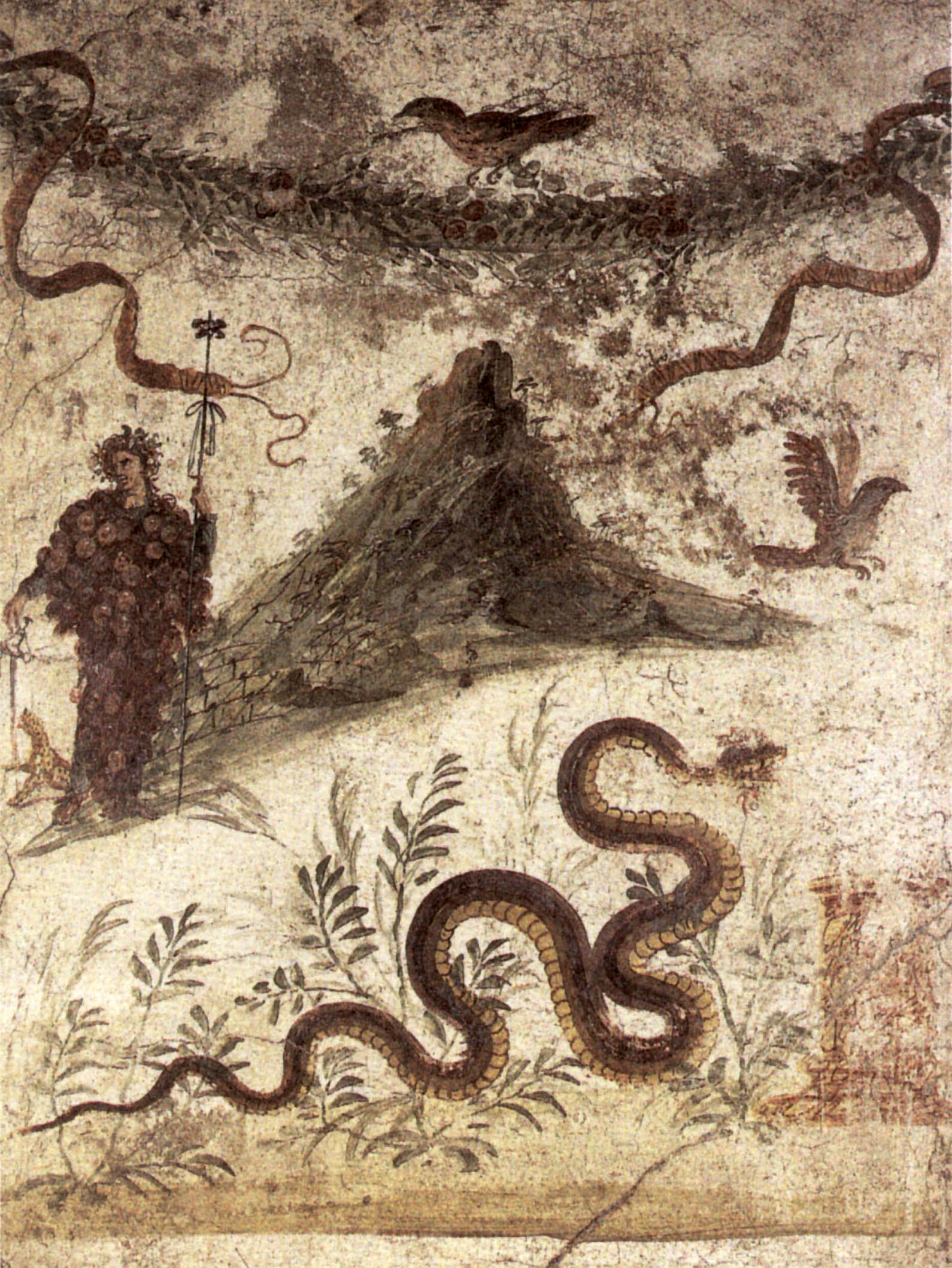
Fresco with Bacchus on Vesuvius (?)
- Provenance: House of the Centenary (Pompeii) - Place of conservation: National Archaeological Museum of Naples (Italy) - Chronology: 1st cent. CE
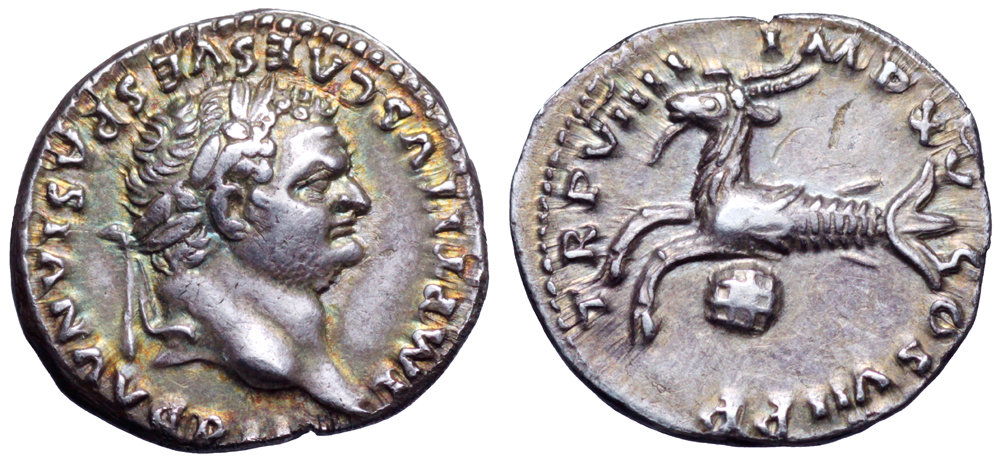
IMAGE n° 2: Denarius with laureate bust of Titus and Capricorn
- Provenance: House of the Gold Bracelet (Pompeii), 1974 - Place of conservation: National Archaeological Museum of Naples (Italy) - Chronology: September / October 79 CE
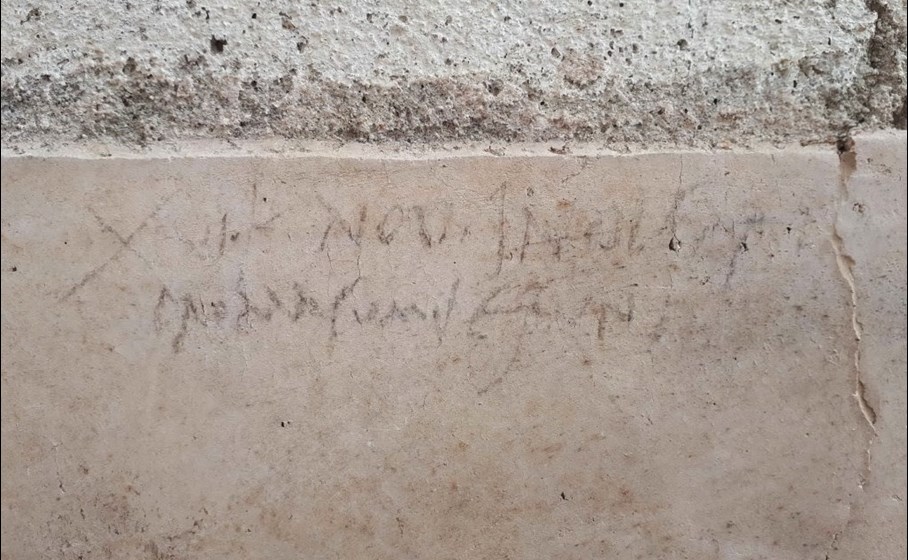
IMAGE n° 3: Charcoal graffiti
- Provenance: House with Garden (Pompeii), 2018 - Place of conservation: In situ - Chronology: 17th October 79 CE

Relief panel depicting an earthquake shaking the Forum of Pompeii - Provenance: House of Caecilius Iucundus (Pompeii) - Place of conservation: National Archaeological Museum of Naples (Italy) - Chronology: 62-79 CE

Relief panel depicting an earthquake shaking the Vesuvian Gate of Pompeii - Provenance: House of Caecilius Iucundus (Pompeii) - Place of conservation: National Archaeological Museum of Naples (Italy) - Chronology: 62-79 CE
tree, altar with offerings and a garland, walls of the city, chariot with two oxen transporting something, the gate of the walls (Vesuvius gate), next to the Castle of Waters (highest part of Pompeii)
water collected at highest part of city where there was a huge basin, from there pipes and different channels + instructors were able to differentiate into different places
pressure helped with distribution of water throughout the city

Dedicatory inscription at the entrance of the Temple of Isis (CIL X 846) - Provenance: Temple of Isis (Pompeii) - Place of conservation: National Archaeological Museum of Naples (Italy) - Chronology: 62-79 CE

dedicatory inscription at entrance of Palaestra
if earthquake took place in 62.63
inscription is one of the last things you do during a restoration (is it possible to have taken 14 years)
Dedicatory inscription at the entrance of the so-called “Palaestra” (CIL X 1406) - Provenance: Insula Orientalis II (Herculaneum) - Place of conservation: National Archaeological Museum of Naples (Italy) - Chronology: 76 CE
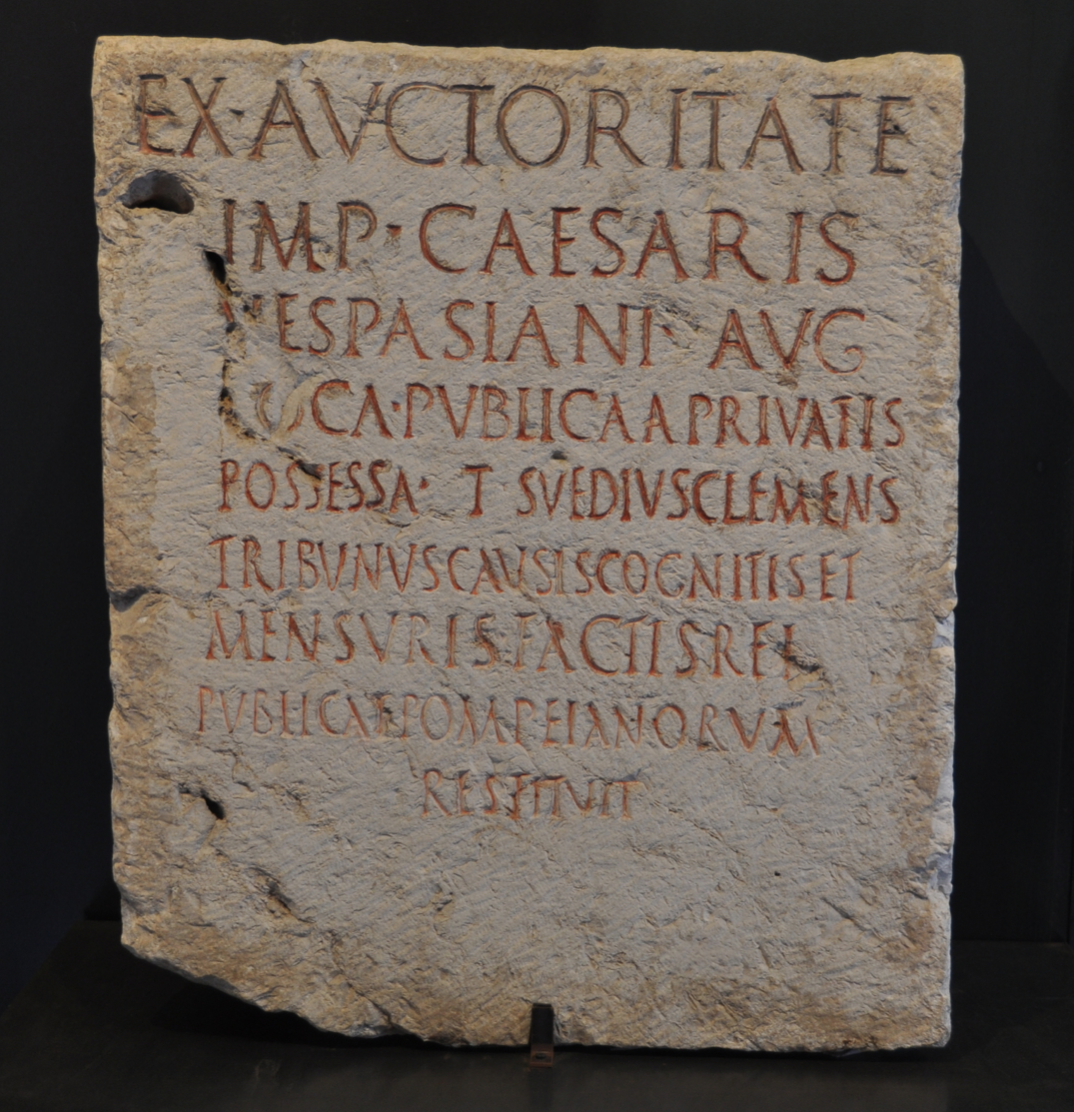
Inscription regarding the tribune Titus Suedius Clemens
Provenance: Near the Herculaneum Gate (Pompeii)
Place of conservation: National Archaeological Museum of Naples (Italy)
69-79 CE
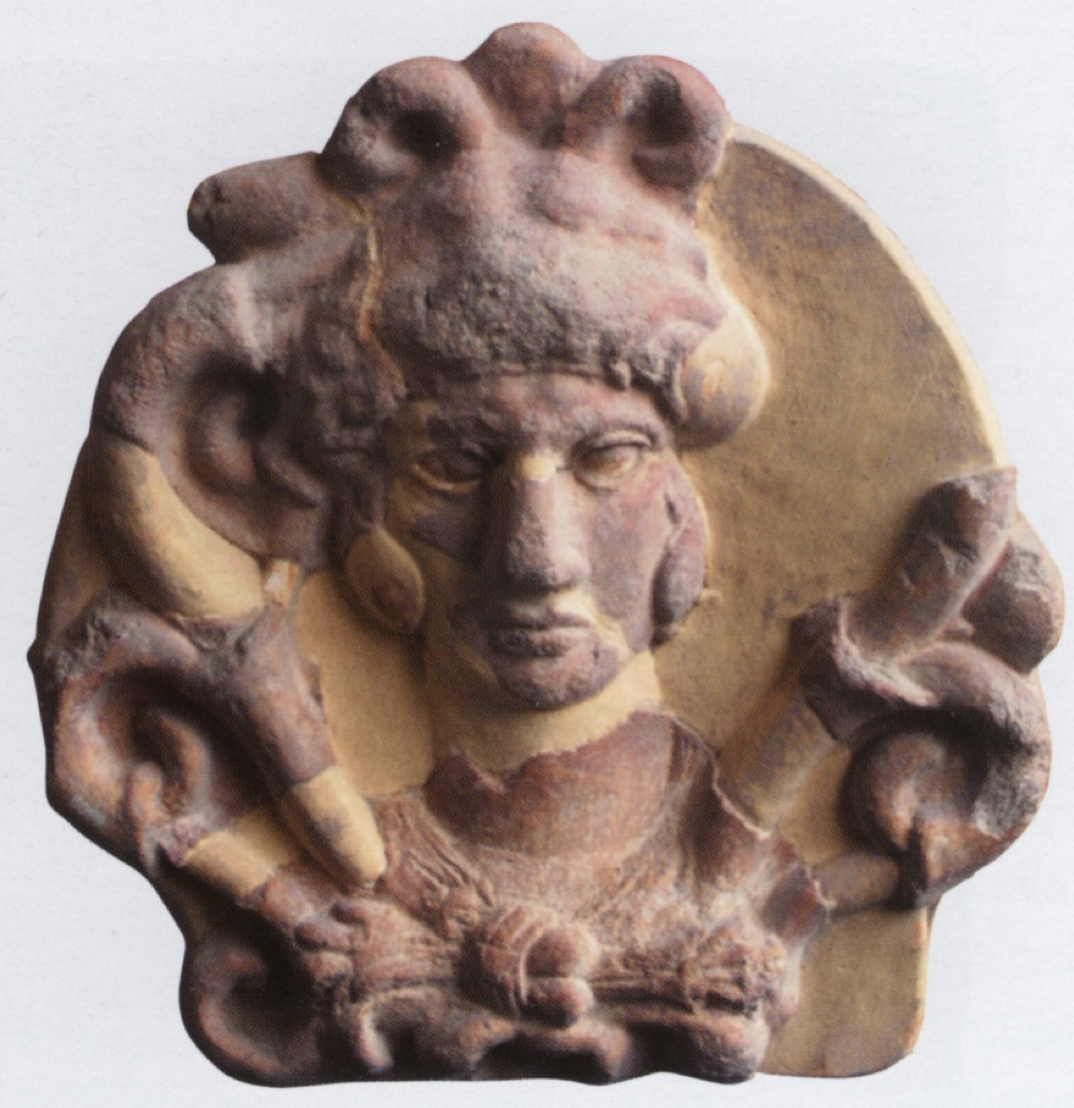
embellish the building, but also to protect the rounded part of the roof tiles (functional role!)
Provenance: Doric Temple (Pompeii)
Conservation: Pompeii Antiquarium (Italy)
4th century BCE
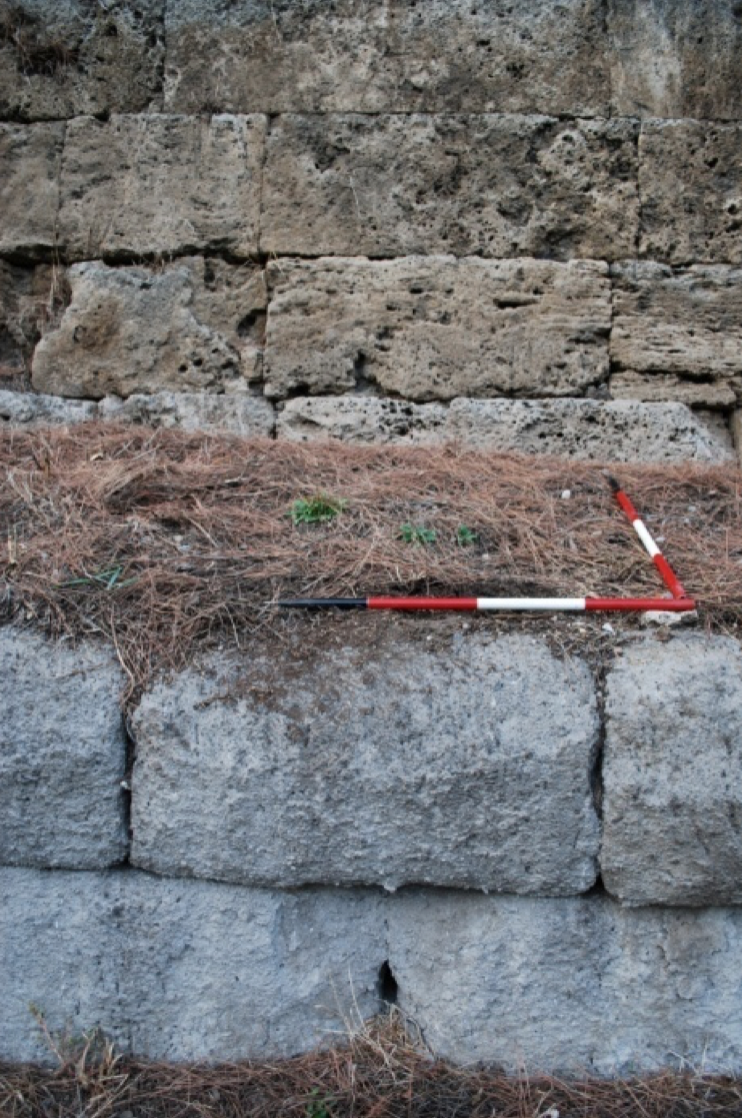
near the Nocera gate (Pompeii)
Conservation site: in situ
600-550 BCE
“Details of the walls of pappamonte” → soft rock
walls could not have had a military function for protection (way too small! can step over), could limit movement of cattle or something to do with agriculture
if limits are unclear and only a few blocks excavated → Herculaneum
if mostly evacuated and well defined → Pompeii
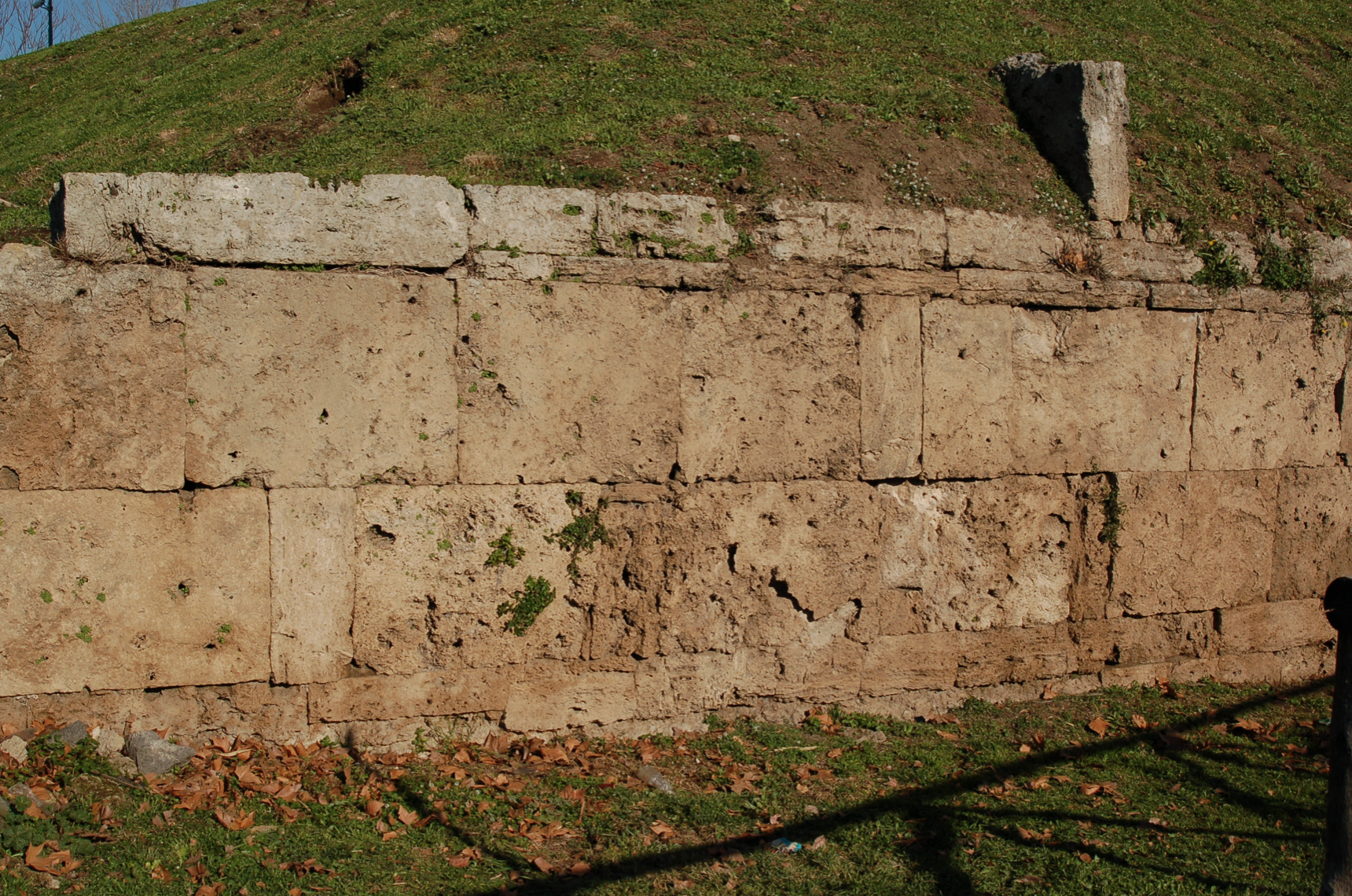
city walls to defend the city against intruders!
Provenance: Vesuvian Gate (Pompeii)
Place of Conservation: in situ
Chronology: 500-450 BCE
The signs of Roman conquest on the Samnite Walls
this part is the lowest, where the city walls are most vulnerable
Herculaneum Gate (Pompeii)
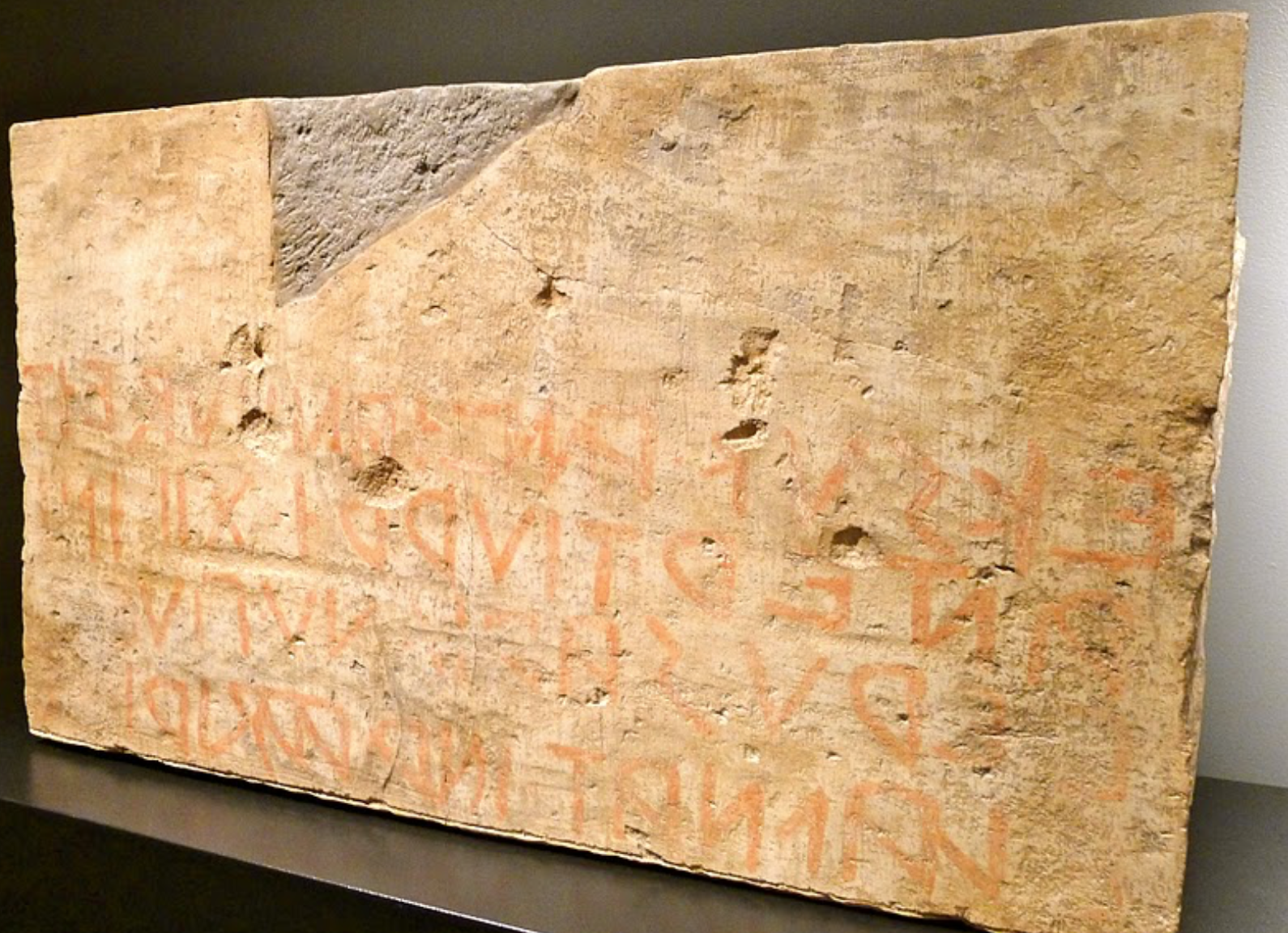
pre-Roman language!!
“The roads from this city-quarter between tower 12 and the Sarinian gate where Maras Adiriis (son) of Vibius is in command” → suggests that all the towers were numbered and used to indicate to soldiers where to go in the case of an attack → way to organize troops!
Provenance: Casa di Pansa (Pompeii)
place of conservation = uncertain
chronology: 90-88 BCE
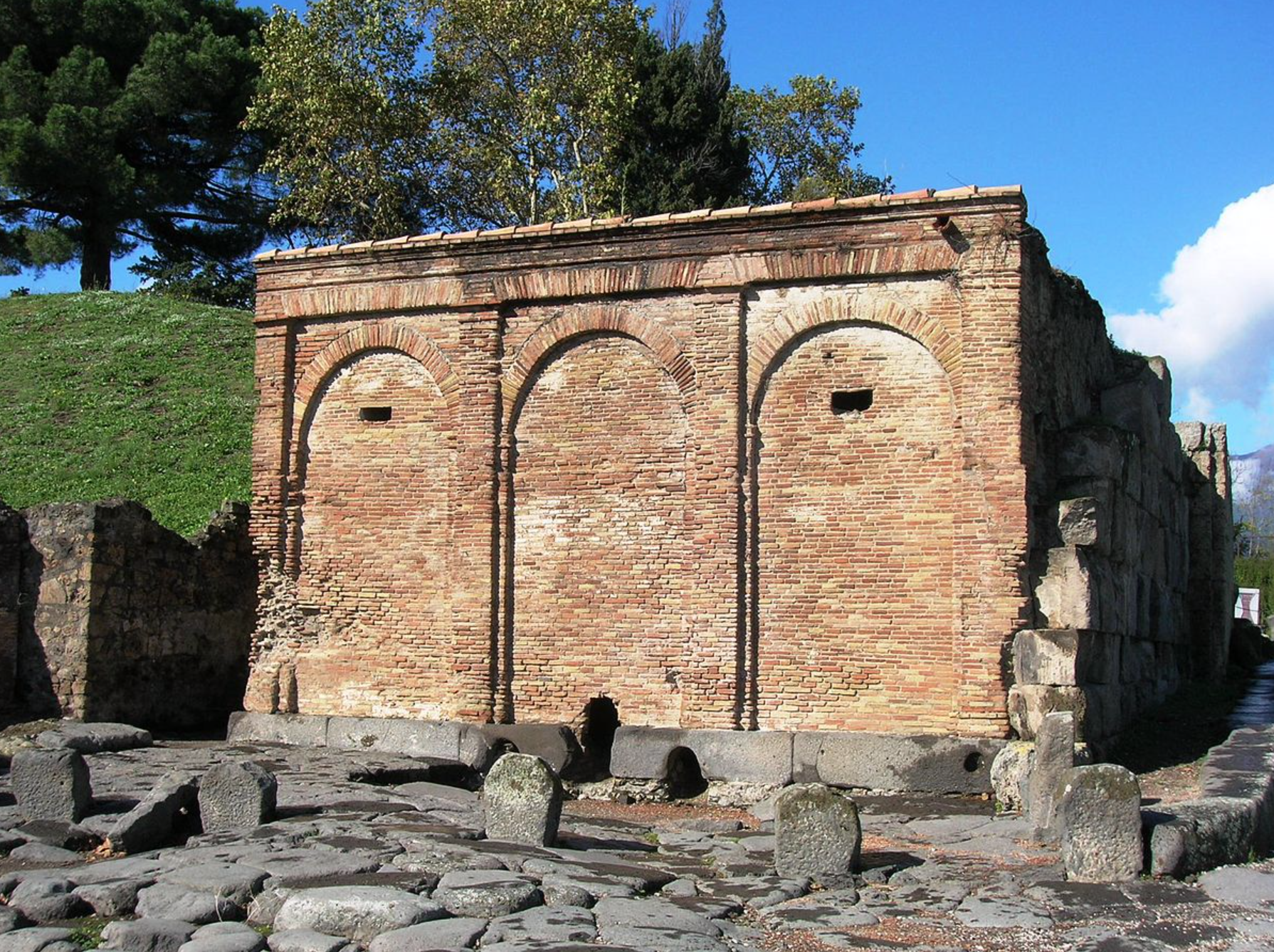
The “Castellum Aquae”
- Provenance: The Vesuvian Gate (Pompeii)
- Place of conservation: In situ
- Chronology: 62-79 BCE
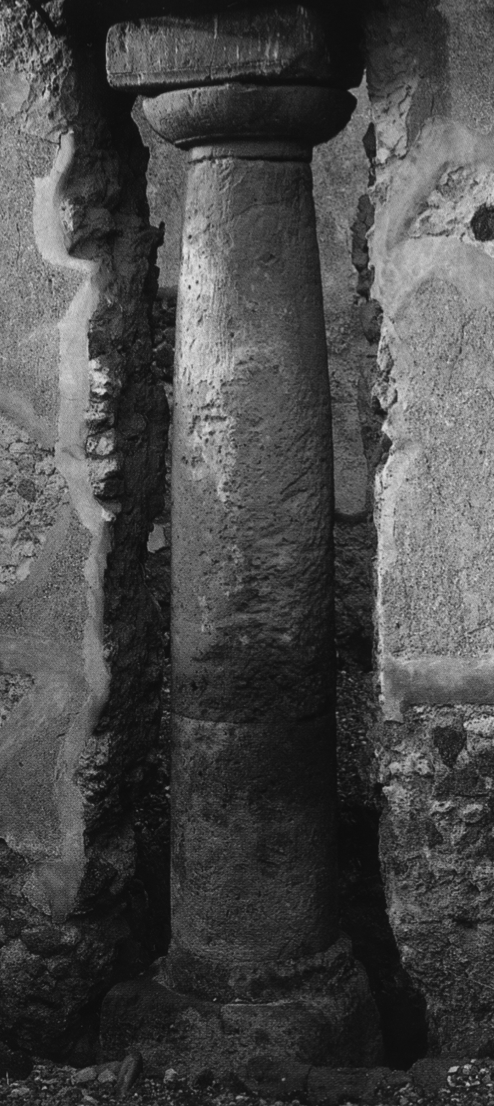
The Etruscan Column
- Provenance: House of the Etruscan column (Pompeii)
- Place of conservation: In situ
- Chronology: 6th cent. BCE
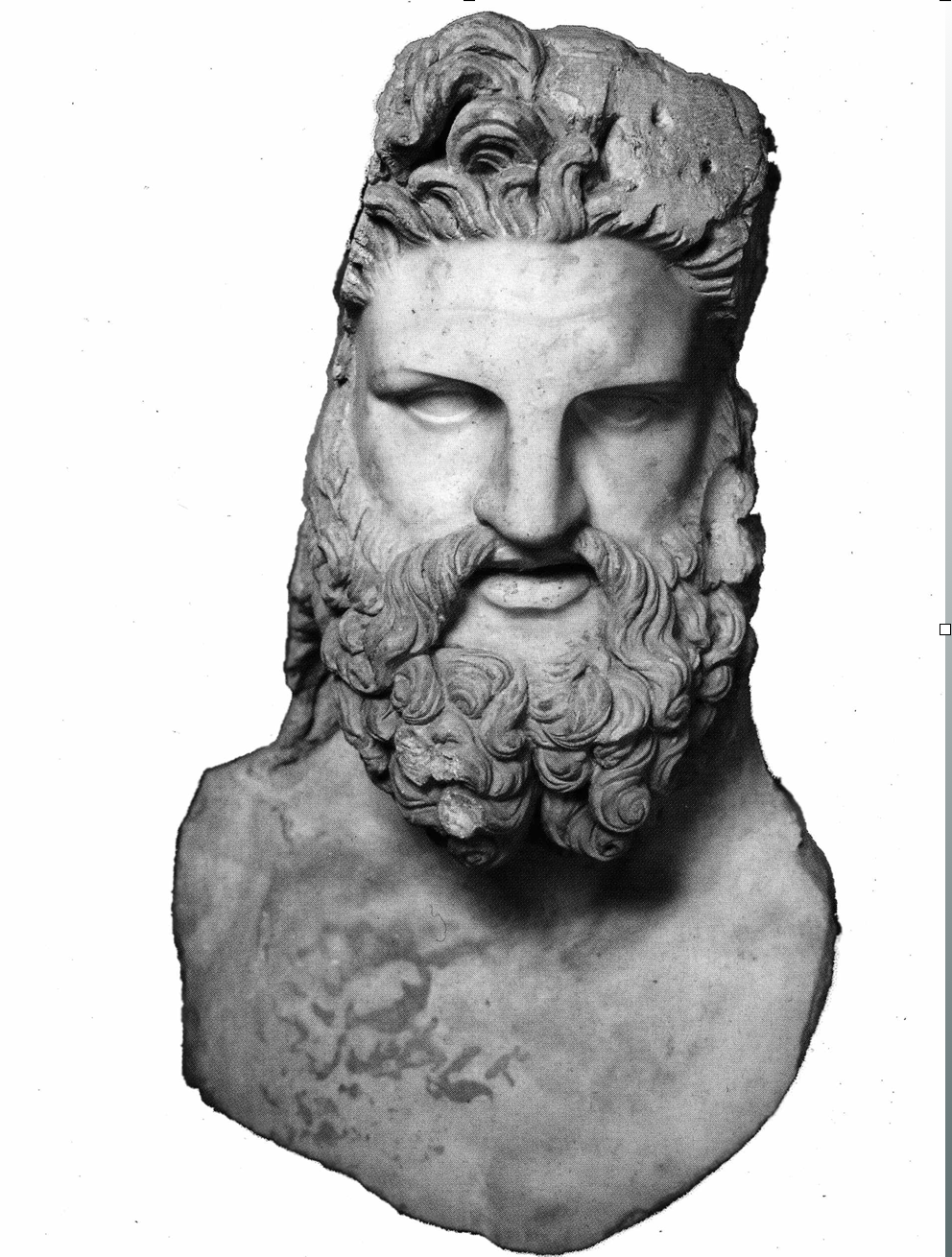
- head of Jupiter
connect creation of temple with abandonment of its column along the beach
Provenance= temple of Jupiter
Conserved in National Archeology Museum in Naples
chronology: 1st century BCE
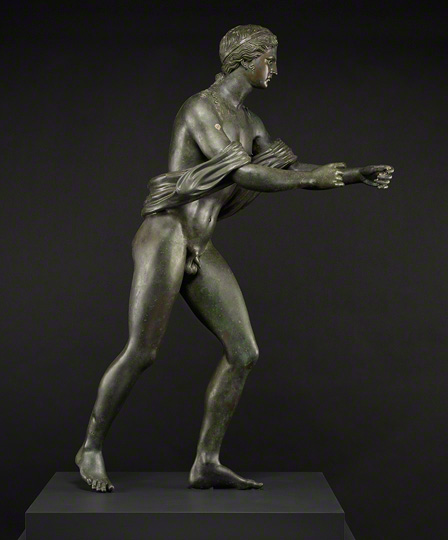
meant to be holding a bow, not boxing
bow shows potential of solving health problems, capabilities
Provenance = Temple of Apollo
Conservation: National Archaeological Museum Naples
1st century BCE - 79 CE
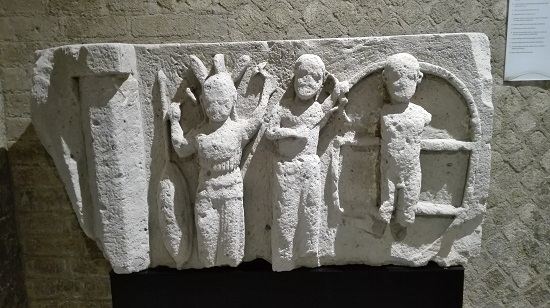
Metope with Athena, Hermes, and Ixion
Temple of Apollo (pompeii)
Conservation: Antiquarium Pompeii (italy)
end of 4th century BCE
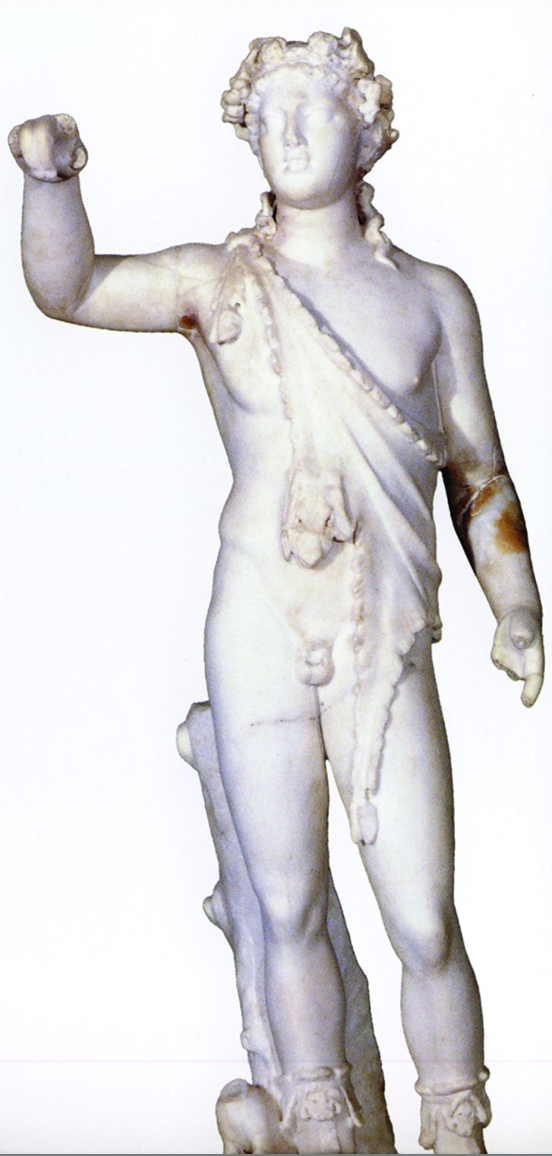
Bacchus (god of wine): Marble Statuette of Bacchus-Osiris
Provenance: Temple of Isis (pompeii)
National Archaeology Museum of Naples (Italy)
62-79 CE
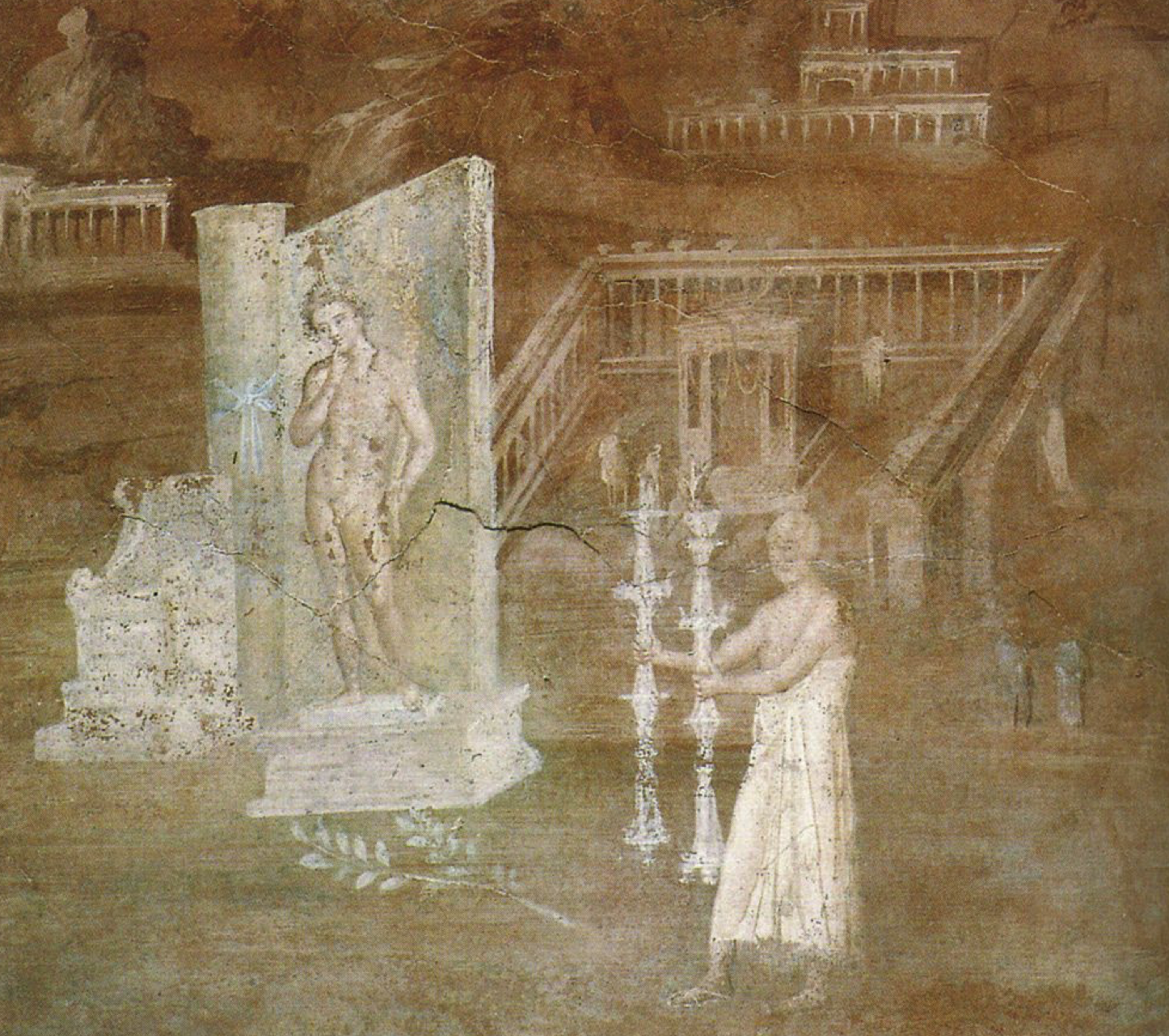
Fresco with Harpocrates and Egyptian Priest
- Provenance: Temple of Isis (Pompeii)
- Place of conservation: National Archaeological Museum of Naples (Italy)
- Chronology: 62-79 CE
painting in a painting → represents the temple itself
priests always clothed in white linen robes
Harpocrates = son of Iris and Osiris
sometimes priests wore mask of Anubis
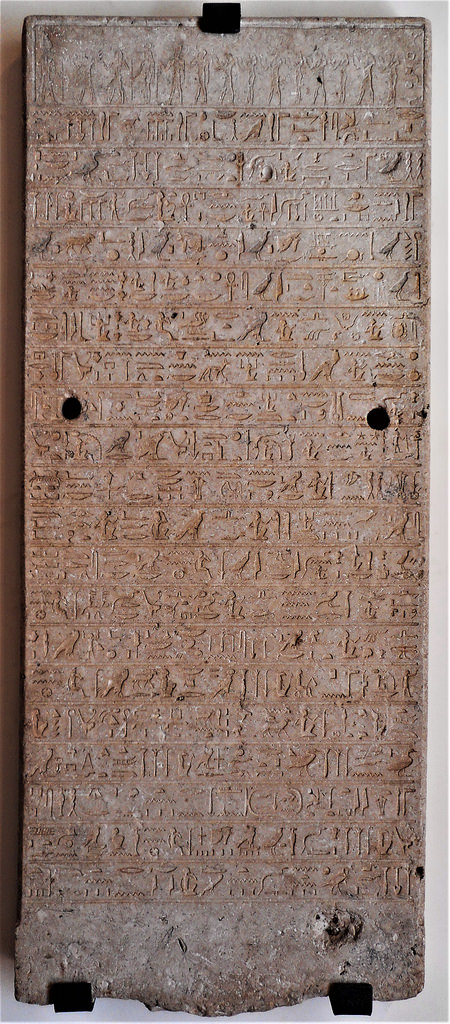
Egyptian stele of Sematawytefnakht
hieroglyphics! only priests or professionals could read these signs
not necessary to read, just evoked idea of Egypt and the East (old and wise place)
Provenance: Temple of Isis
Conservation: Archaeological Museum Naples
Chronology: end of 4th century BCE (OLD)
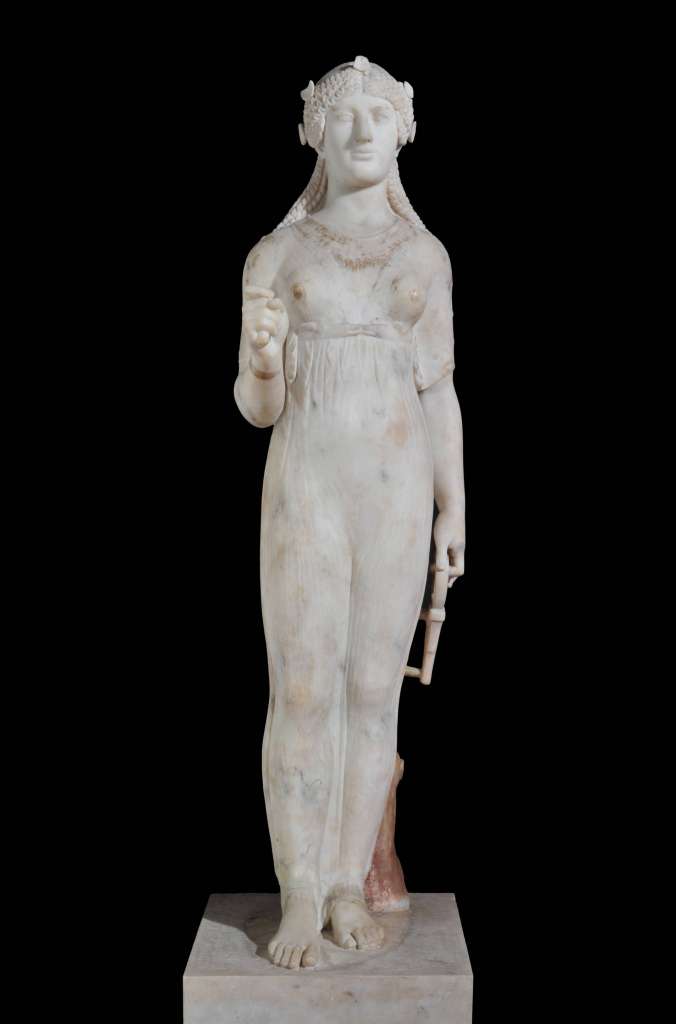
Marble statue of Isis
- Provenance: Temple of Isis (Pompeii)
- Place of conservation: National Archaeological Museum of Naples (Italy)
- Chronology: 1st cent. CE
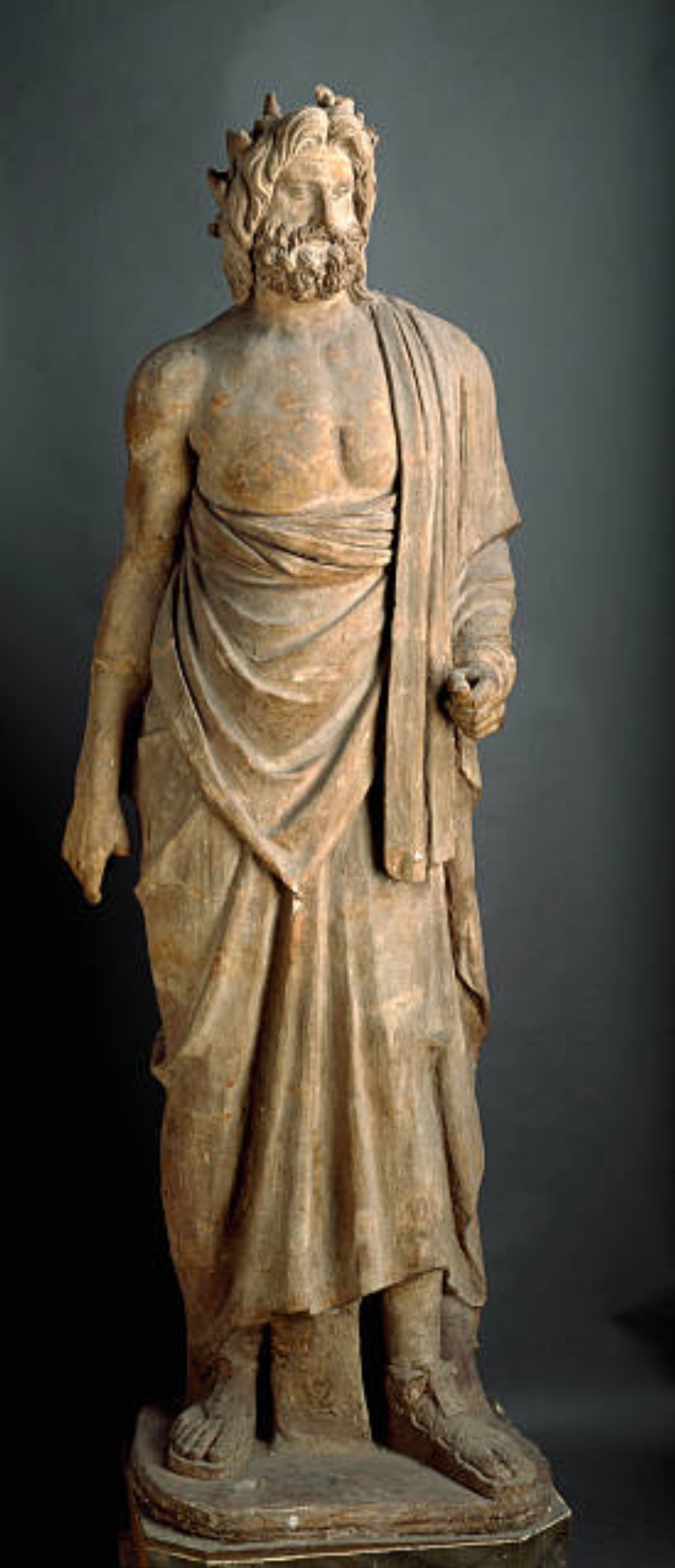
Terracotta statue of Aclepius
originally thought to be temple for catalytic triad but not!
Provenance: Temple of Aesculapius (Pompeii)
Conservation: Archaeological Museum Naples
1 century BCE
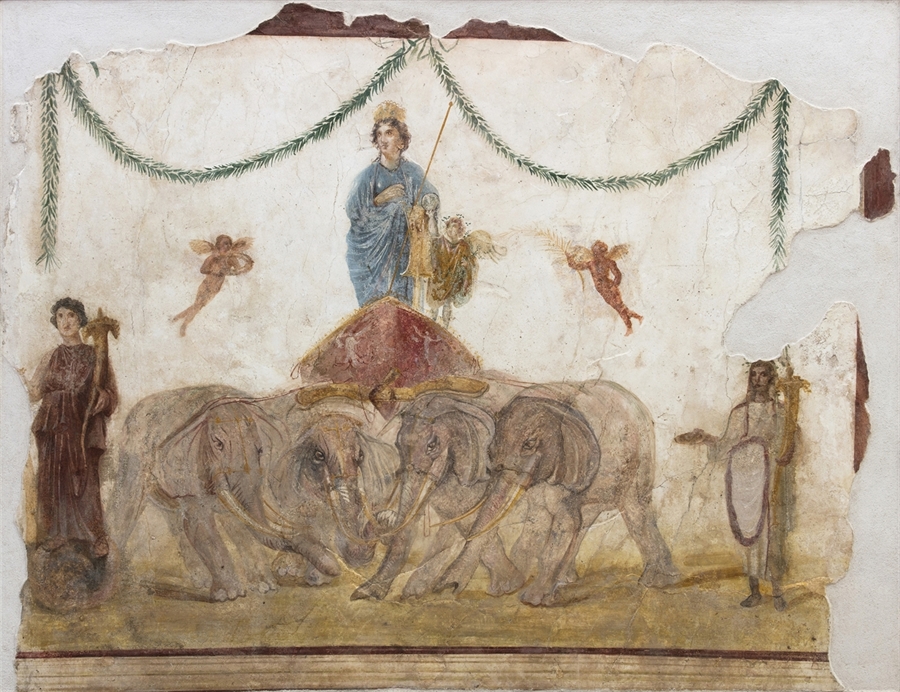
Fresco with Venus standing on a quadriga of elephants - Provenance: House of Verecundus (Pompeii)
- Place of conservation: National Archaeological Museum of Naples (Italy)
- Chronology: 1st cent. CE
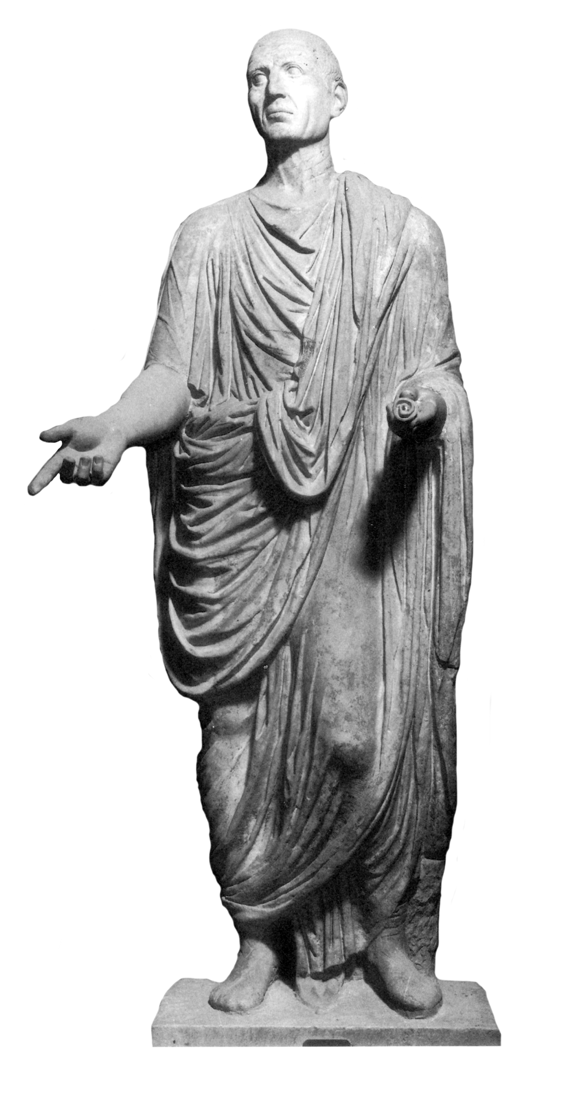
Marble statue of Marcus Tullius
- Provenance: Temple of Fortuna Augusta (Pompeii)
- Place of conservation: National Archaeological Museum of Naples (Italy)
- Chronology: 1st cent. CE
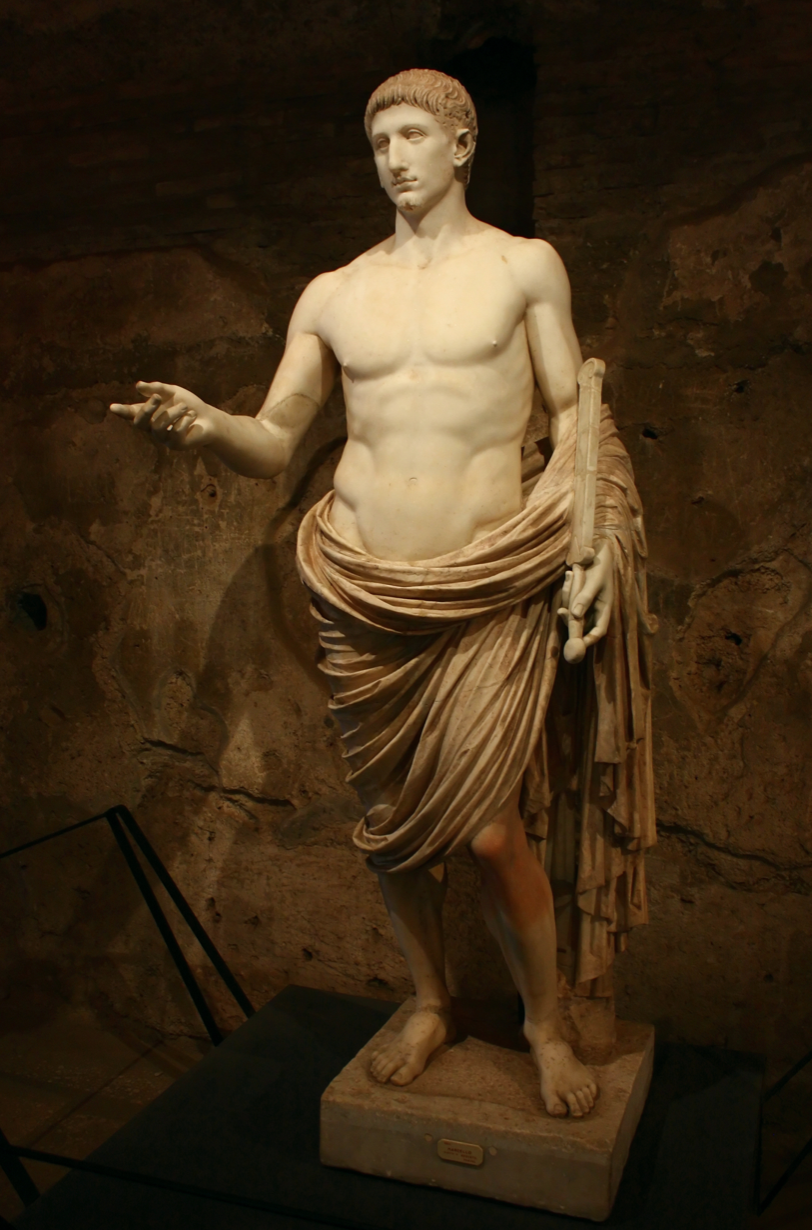
Marble statue of young man
- Provenance: Macellum (Pompeii)
- Place of conservation: National Archaeological Museum of Naples (Italy)
- Chronology: 1st cent. CE
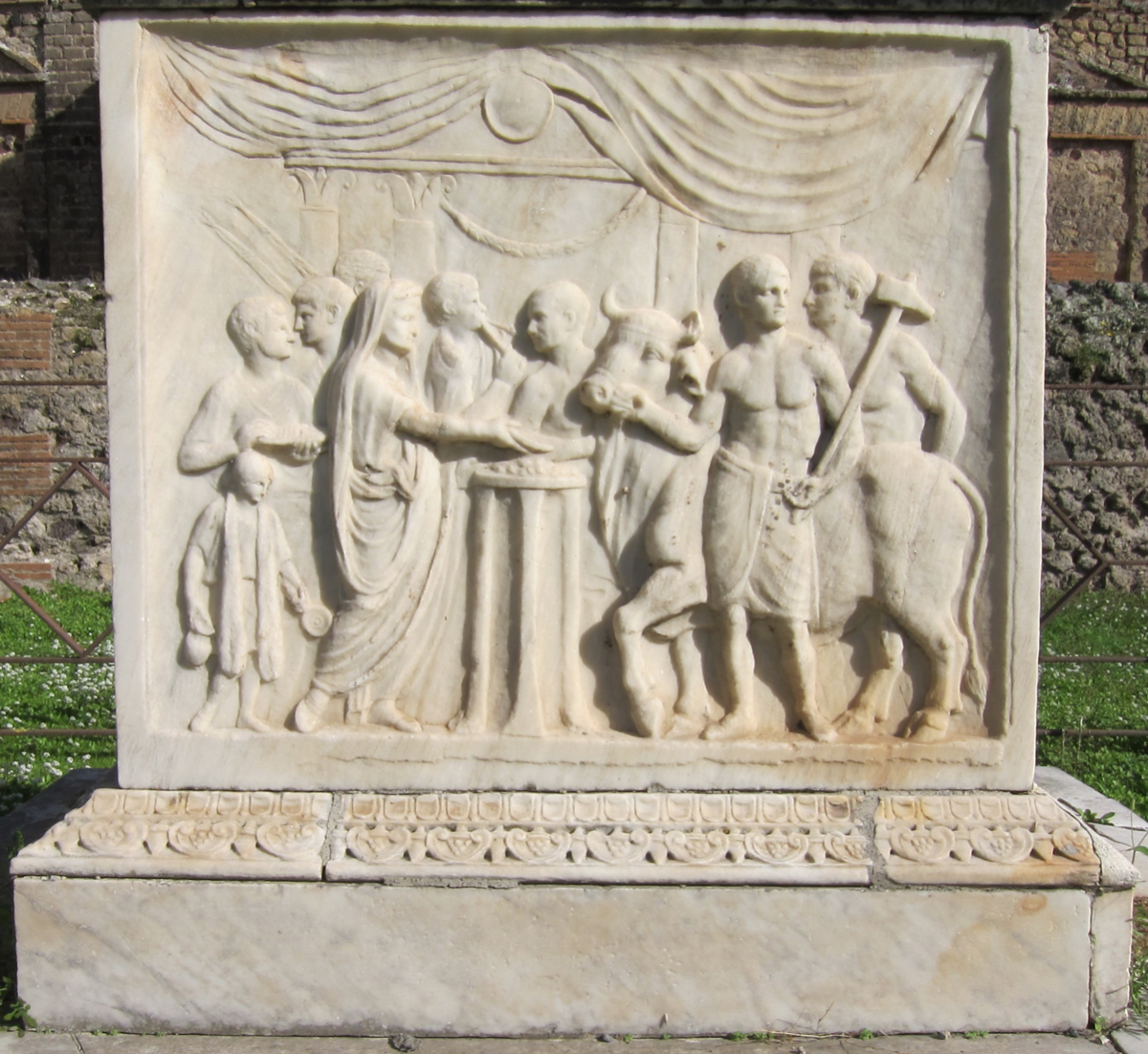
Altar of the temple of the Genius Augusti
- Provenance: Temple of the Genius Augusti (Pompeii) - Place of conservation: National Archaeological Museum of Naples (Italy)
- Chronology: 1st cent. CE
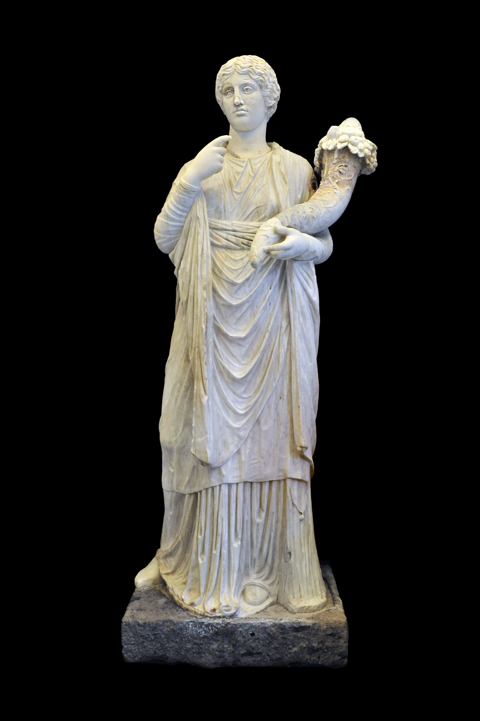
Marble altar of Concordia, Augusta
Provenance (bulding of Eumachia), conserved in Naples museum, 1 century CE
used clay and urine to treat skin → there was a basin to pee in the temple so that it wouldn’t go wasted, because the production would use the urine
urine tax → good for the Roman emperor government
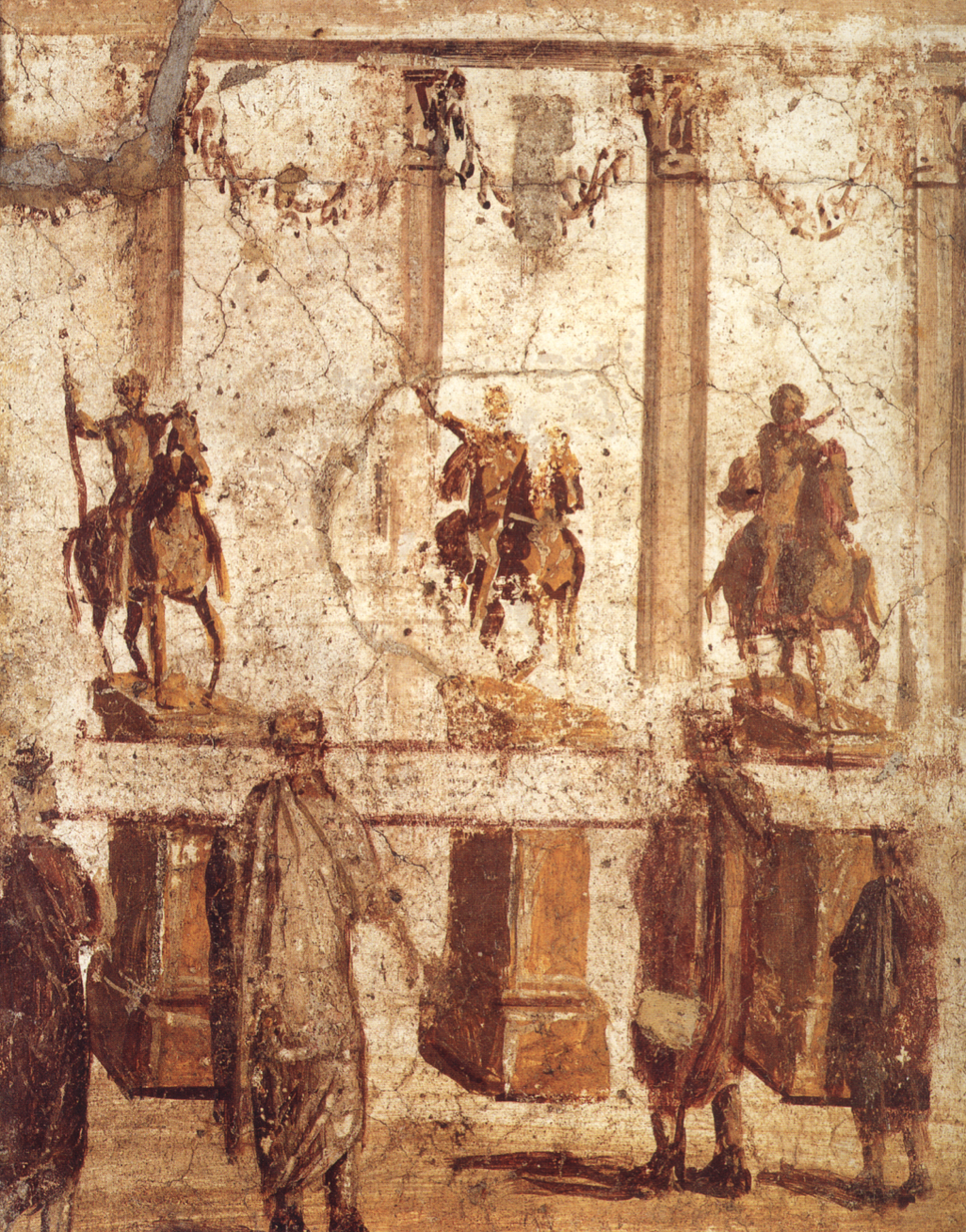
Fresco with representation of the forum of Pompeii
- Provenance: Praedia of Iulia Felix (Pompeii)
- Place of conservation: National Archaeological Museum of Naples (Italy)
- Chronology: 1st cent. CE
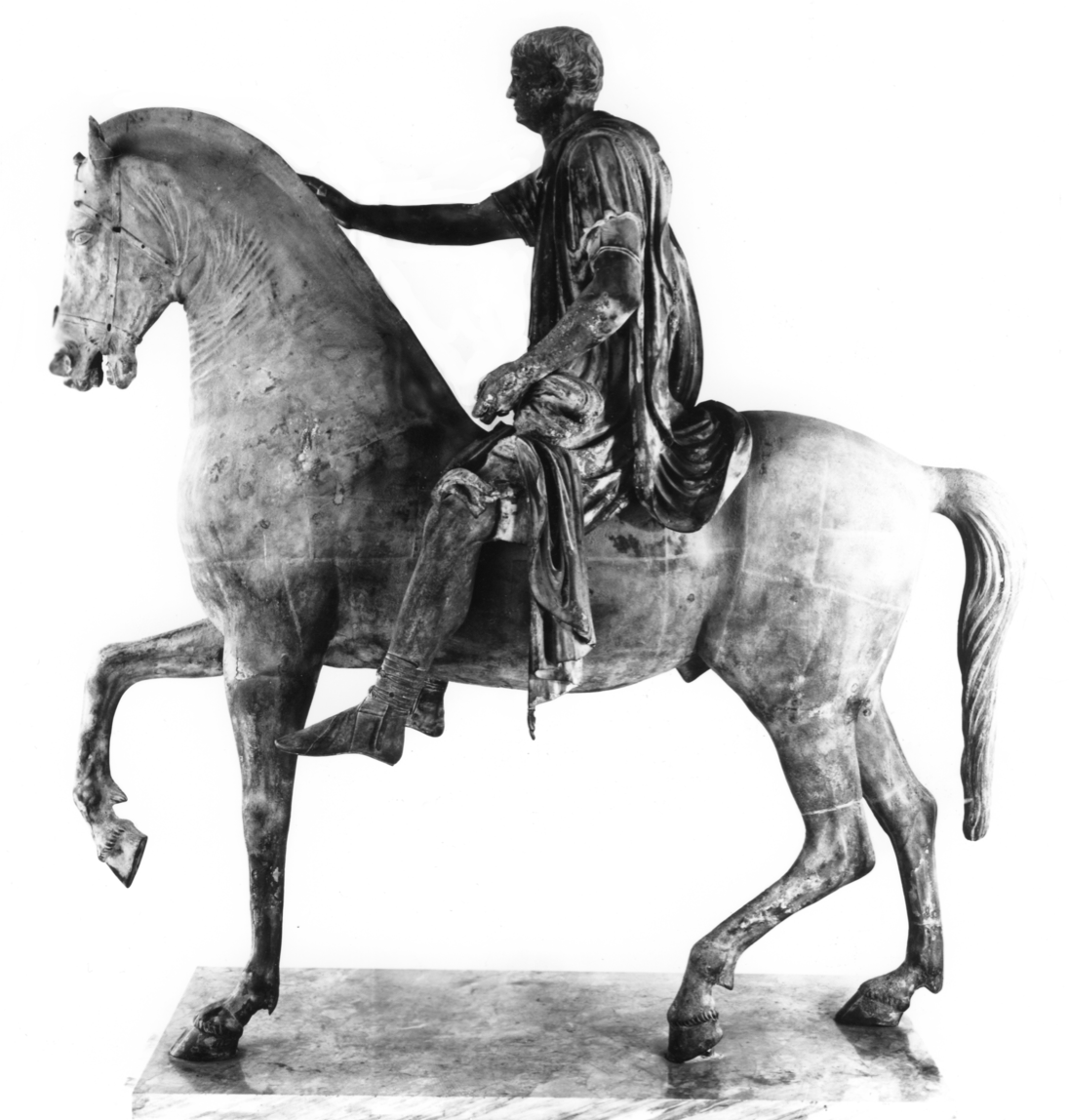
Equestrian bronze statue of Drusus Iulius Caesar (?)
- Provenance: Arch of Via Mercurio (Pompeii)
- Place of conservation: National Archaeological Museum of Naples (Italy)
- Chronology: 20-22 CE (?)
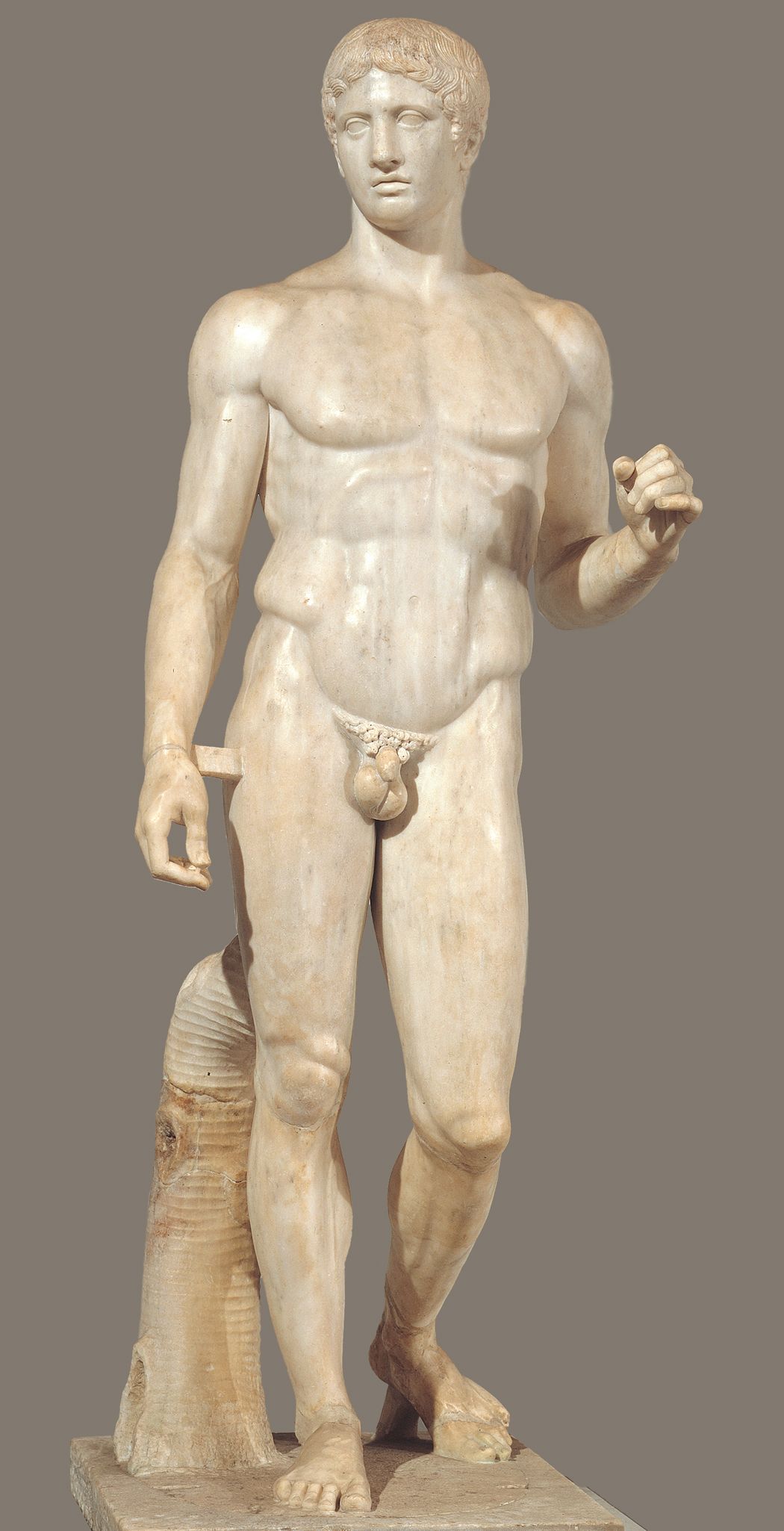
Statue of Doryphoros (spear-bearer)
- Provenance: Samnite Palaestra (Pompeii) - Place of conservation: National Archaeological Museum of Naples (Italy) - Chronology: Roman copy from an original of 5th cent. BCE
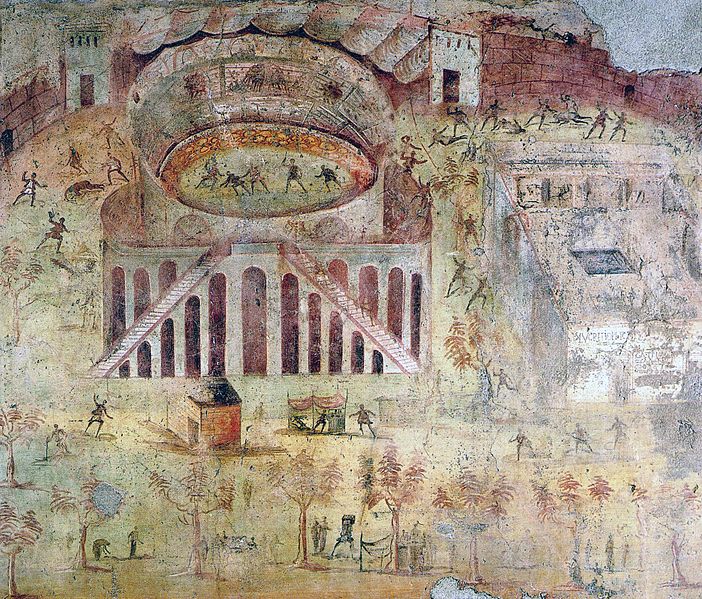
Fresco with riot between Nucerians and Pompeians at the ampitheater
Provenance: House I 3, 23
Place of Conservation: National Archaeological Museum of Naples
Chronology: a little after 59 CE (3 years before huge earthquake and 20 years before eruption!!)
Nuceria = not far from Pompeii, more important than Pompeii in imperial times
Tacitus describes this fight! we can date the event to 59 CE, can see representation of palaestra
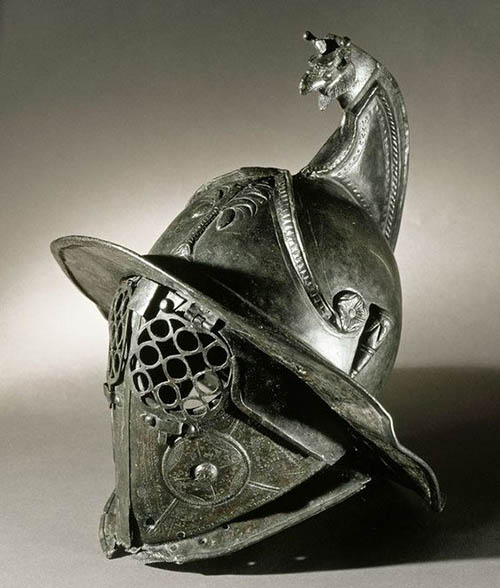
Bronze gladiator helmet
- Provenance: Palaestra (Pompeii)
- Place of conservation: National Archaeological Museum of Naples (Italy)
- Chronology: 1st cent. CE
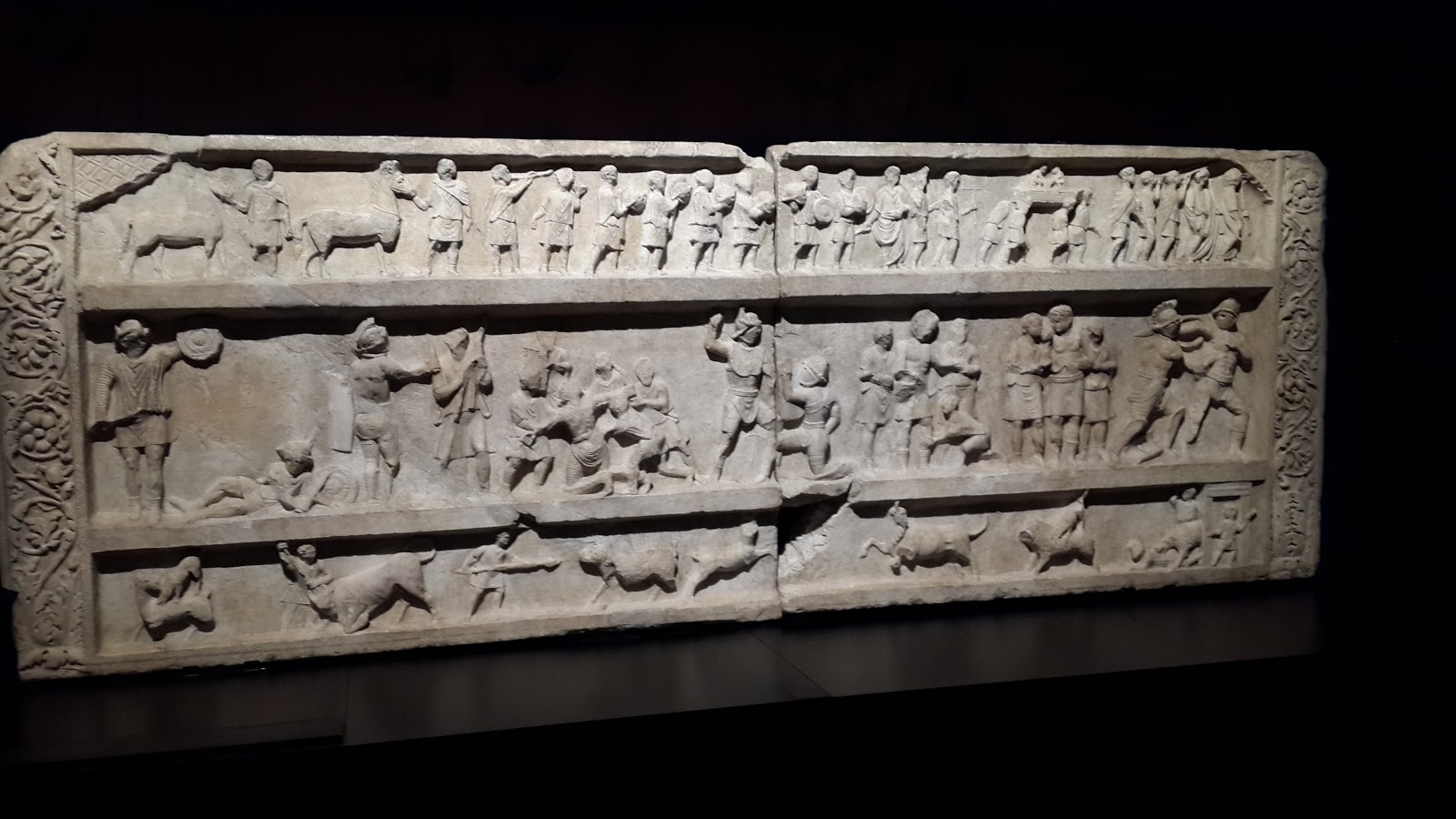
Relief with procession and gladiatorial fights
- Provenance: Stabian Gate (Pompeii)
- Place of conservation: National Archaeological Museum of Naples (Italy)
- Chronology: 1st cent. CE
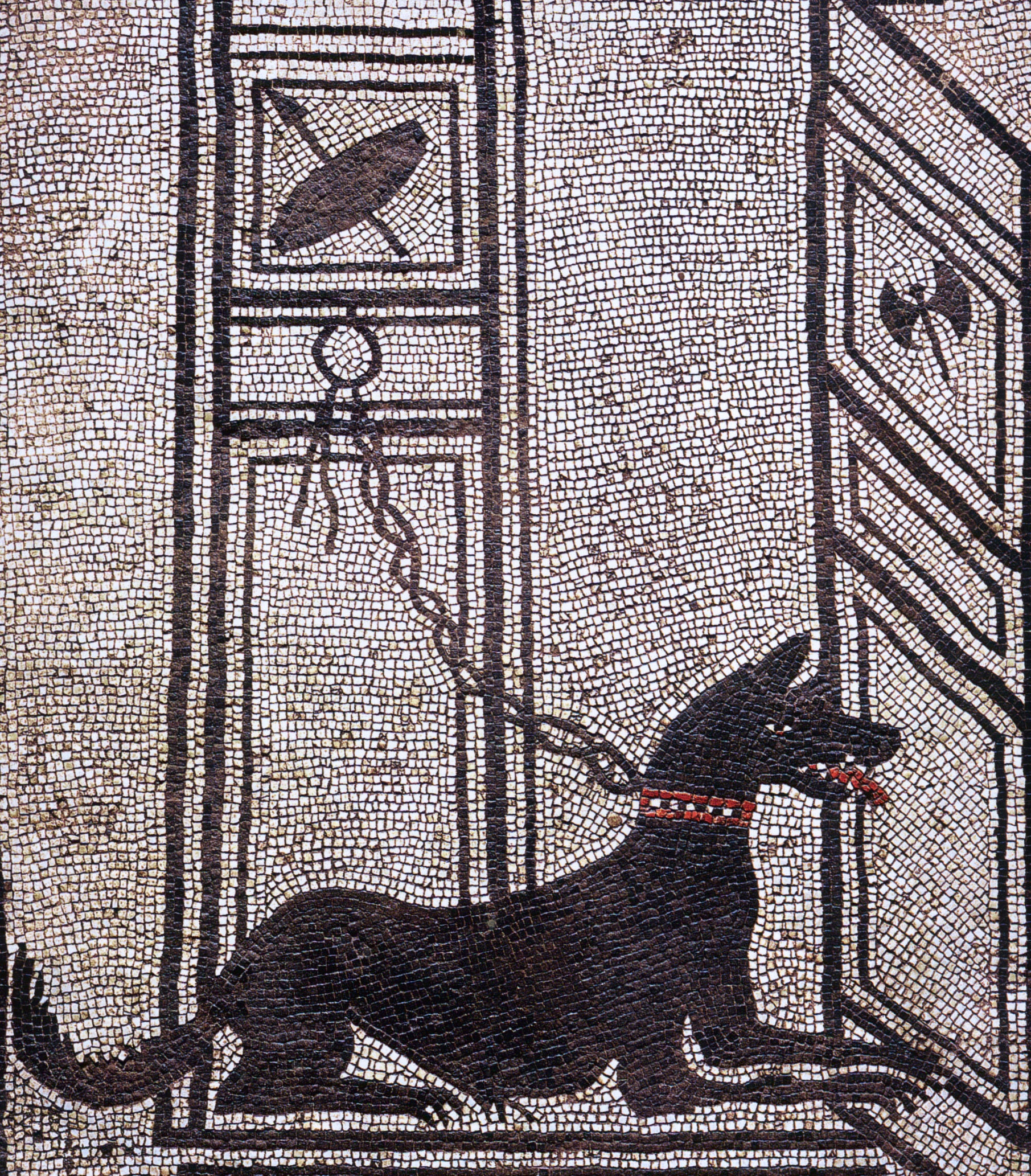
Mosaic with watchdog at open door
- Provenance: House of Paquius Proculus (Pompeii) - Place of conservation: In situ - Chronology: 1st cent. CE
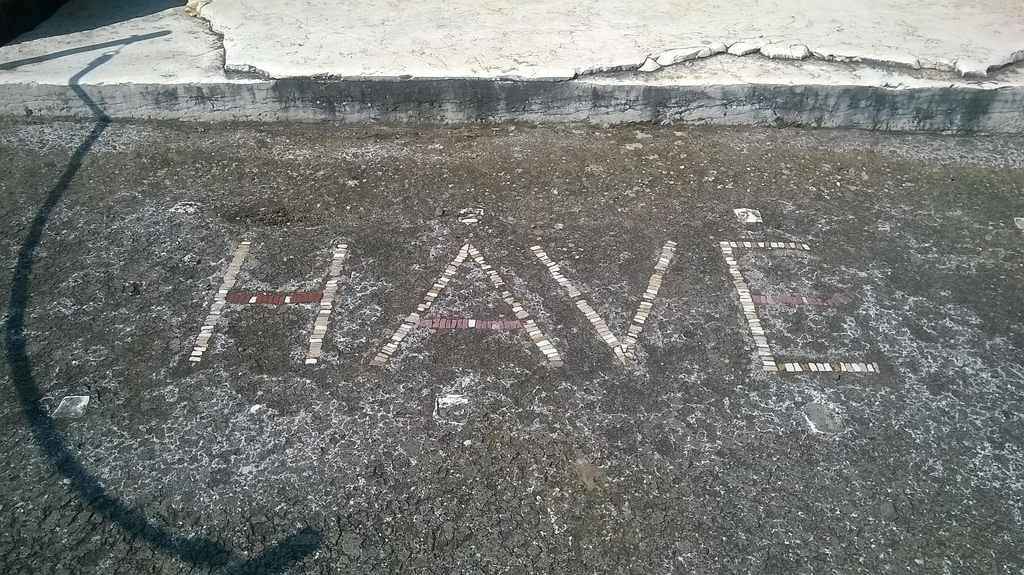
Entrance with HAVE written on pavement (welcome!!)
self-Romanization
- Provenance: House of the Faun (Pompeii) - Place of conservation: In situ - Chronology: 1st cent. CE
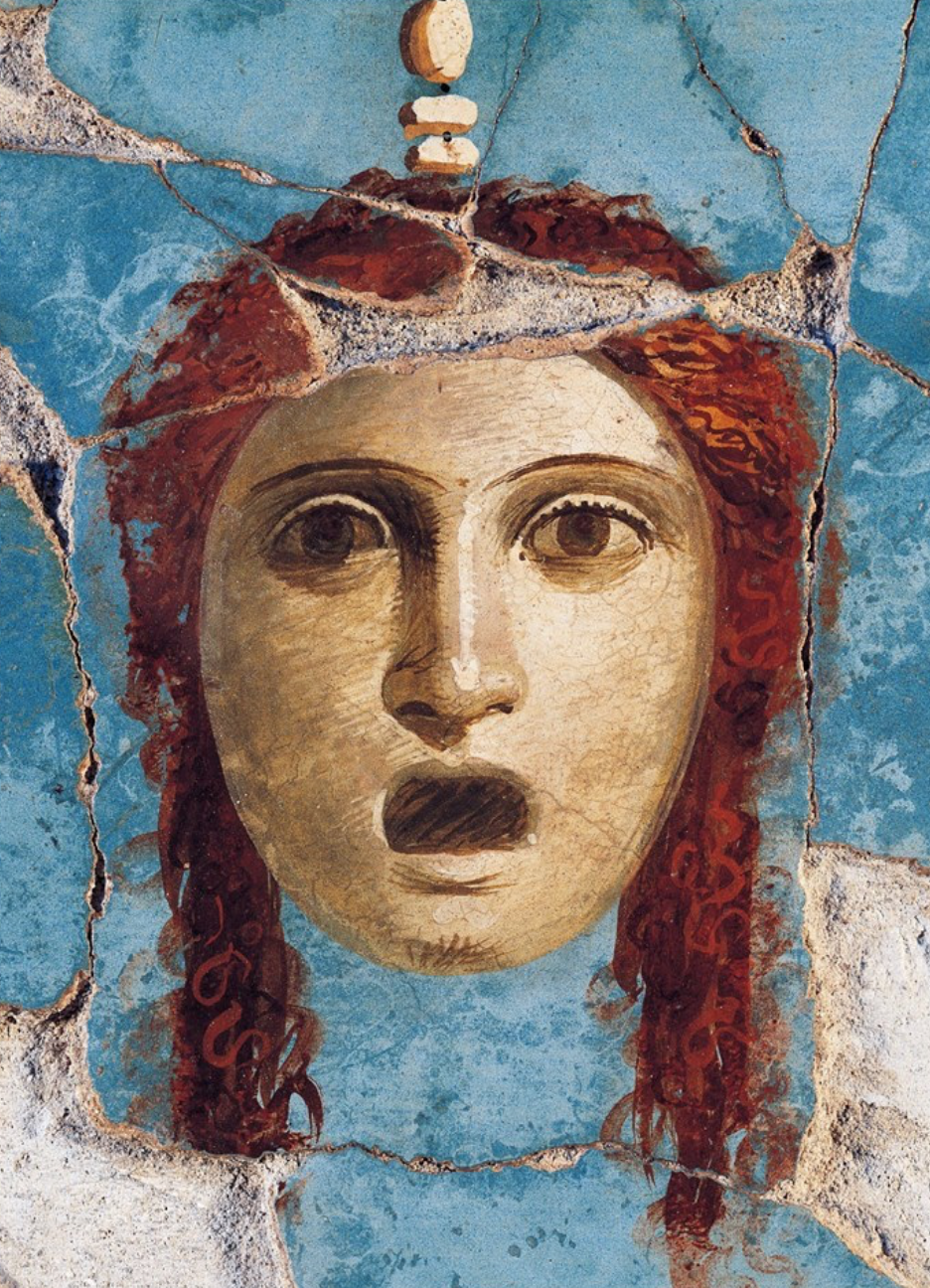
Fresco with female theatre mask
House of Golden Bracelet, In situ, 1st century CE

IMAGE n° 38: Fresco with cupids as perfume makers
- Provenance: House of the Vettii (Pompeii) - Place of conservation: In situ - Chronology: 1st cent. CE
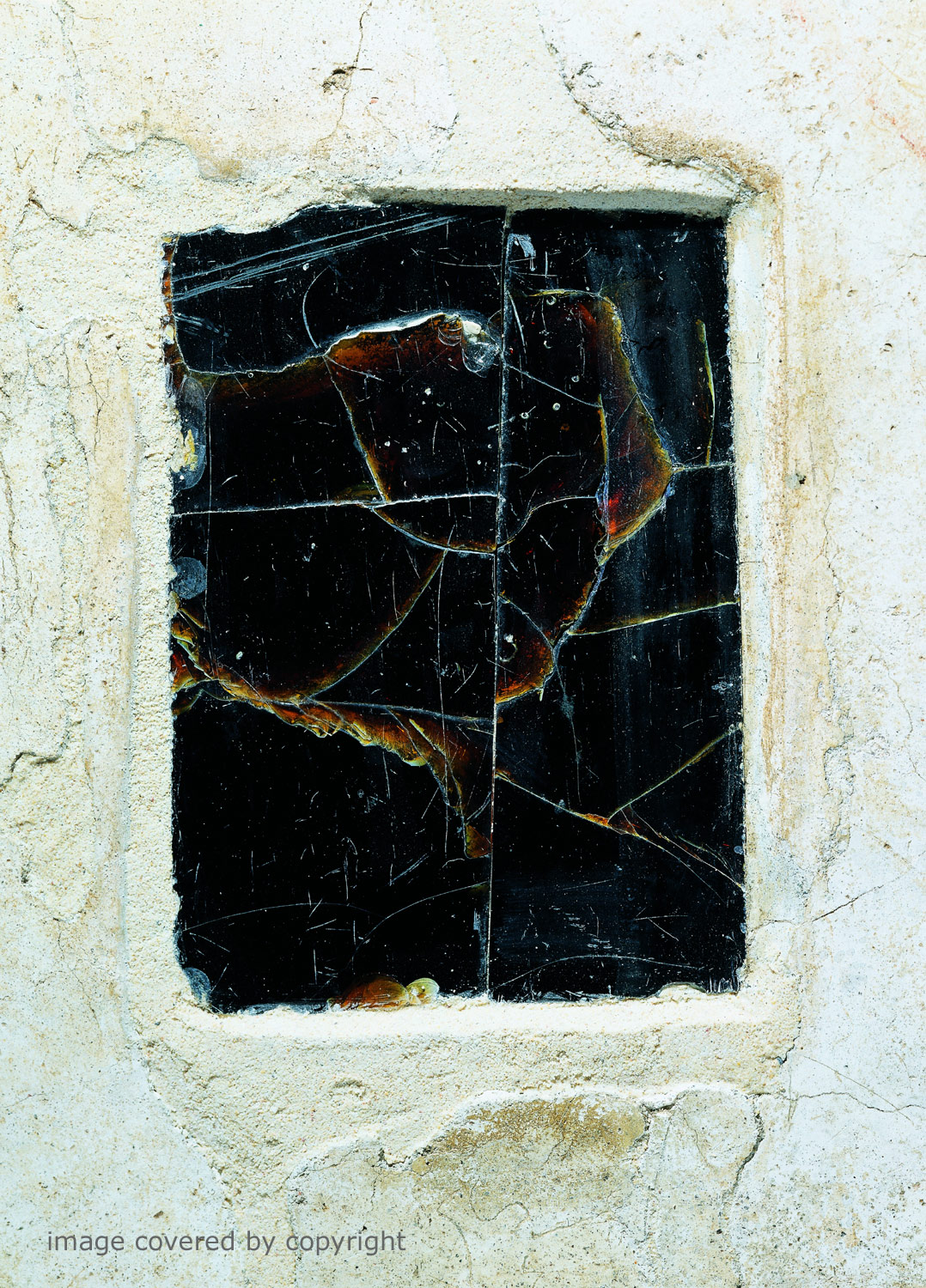
Mirror (?) made with obsidian stone
- Provenance: House of the Orchard (Pompeii) - Place of conservation: In situ - Chronology: 1st cent. CE
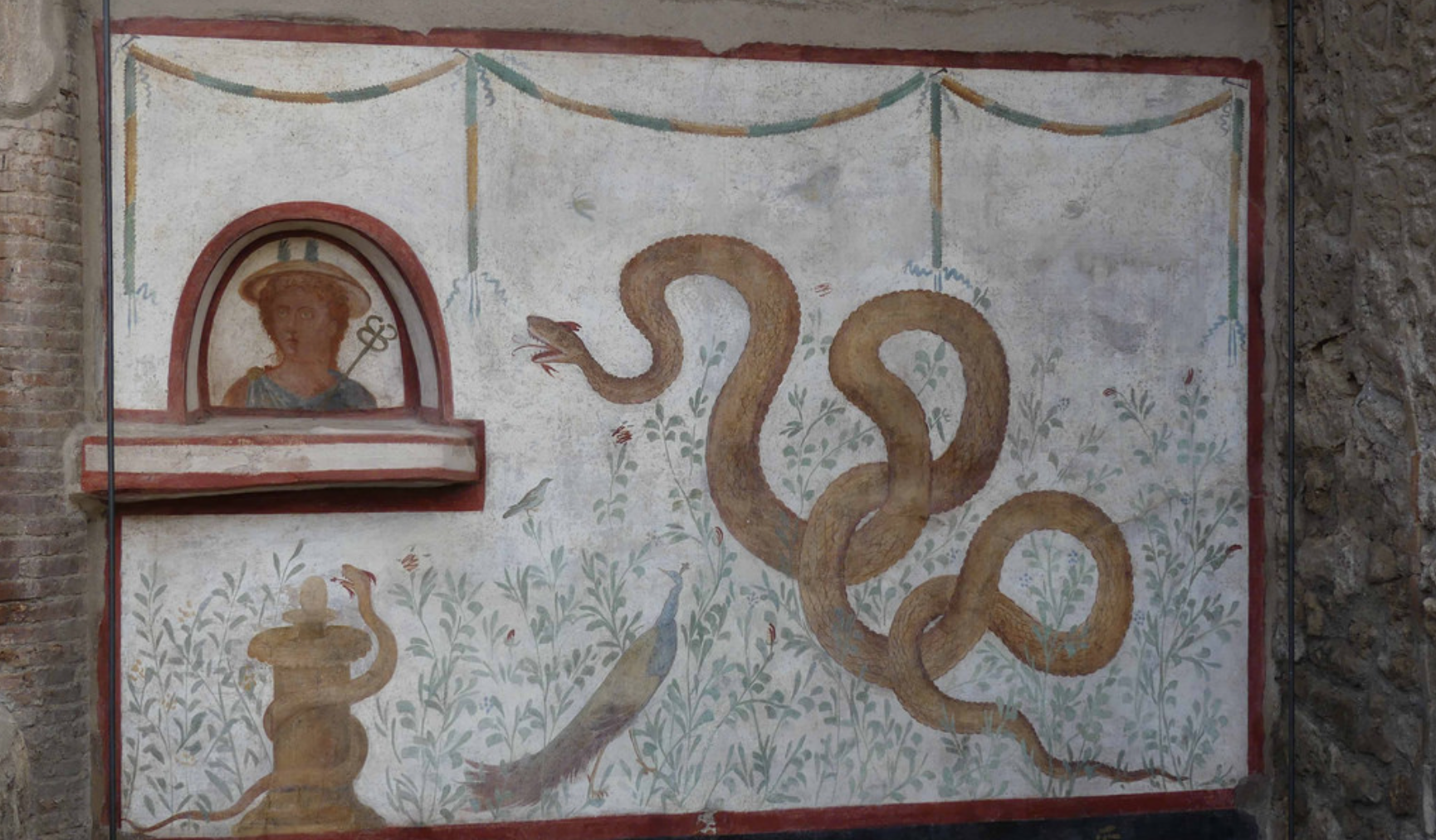
Household Lararium with painting of Mercury, two snakes, a peacock, and birds in a garden scene
spirits protecting the household or representation of traditional gods!
- Provenance: House of the Cryptoporticus (Pompeii) - Place of conservation: In situ - Chronology: 1st cent. CE
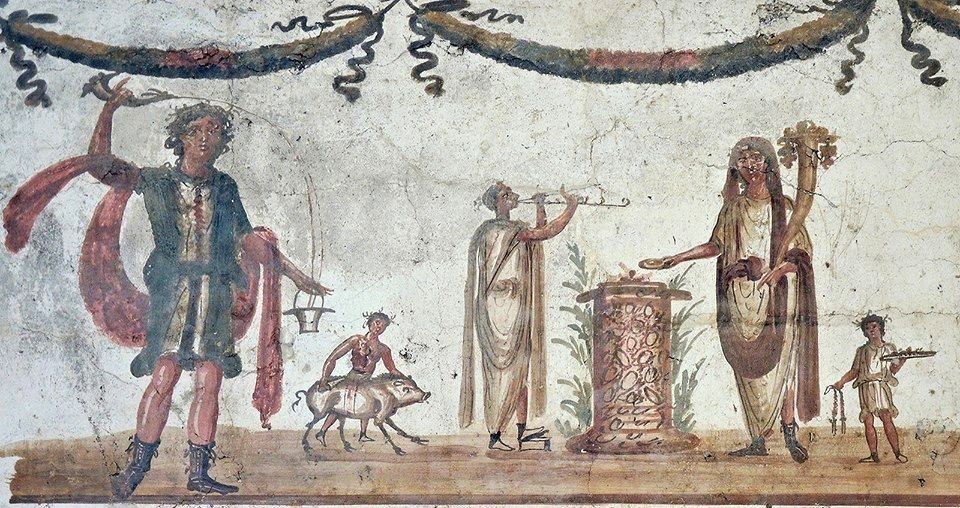
Household lararium with sacrificing Genius
after sacrifices and rituals, directly cooked the meat in the kitchen
Provenance: House of Cipius Pamphilus Felix (Pompeii) - Place of conservation: National Archaeological Museum of Naples (Italy) - Chronology: 1st cent. CE
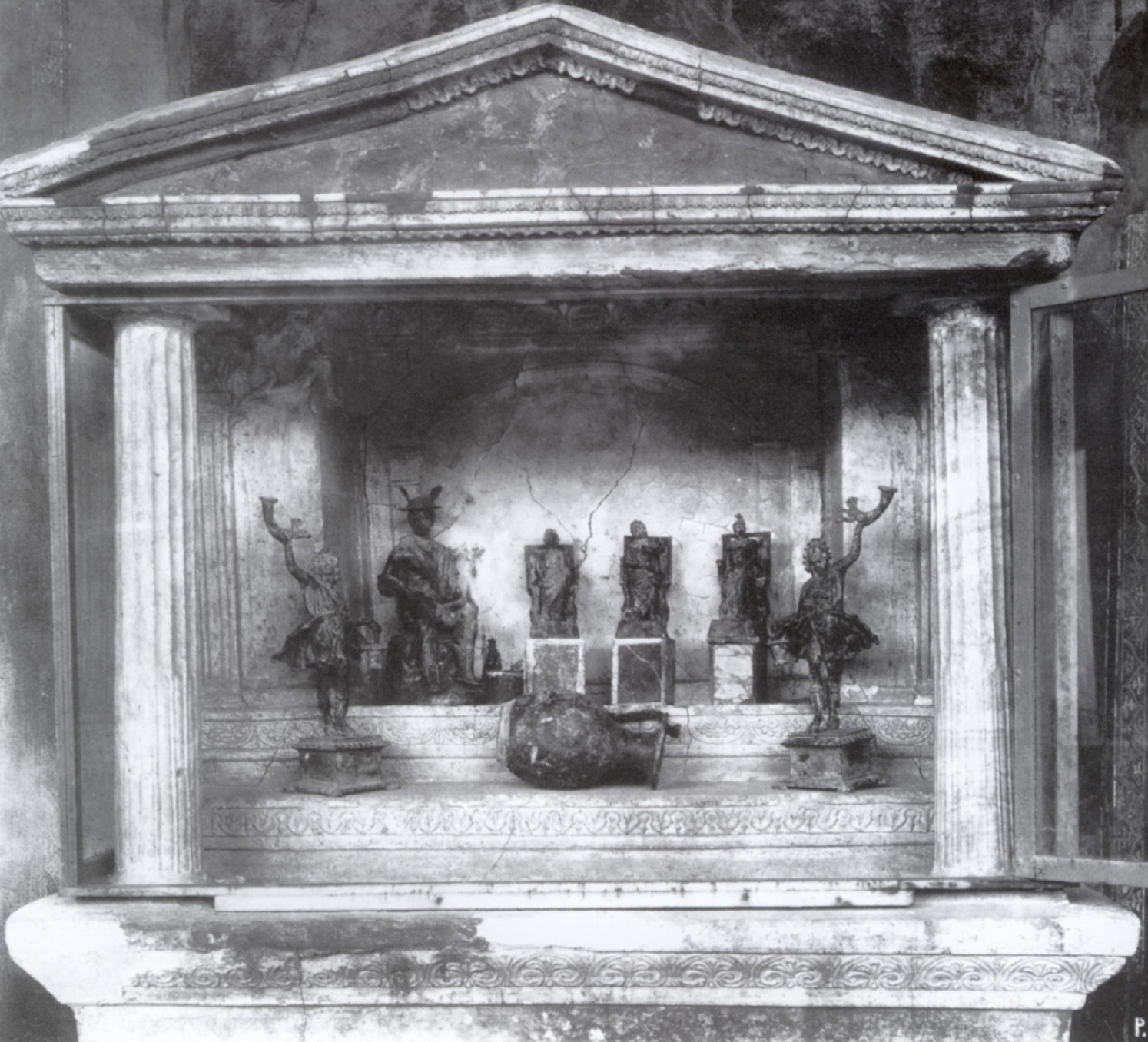
Household lararium with figurines of Lares, Mercury and Capitoline Triad
Provenance: House of the Golden Cupids (Pompeii) - Place of conservation: In situ - Chronology: 1st cent. CE
why were all the shrines almost empty? → were stolen (also stolen during modern excavations), sometimes made of metal (not perishable) and sometimes made of wood (not preserved!)
House of Golden Cupids
Capitoline Triad: Jupiter in center, Minerva on left, Juno on the right, but here positioning is inverted!
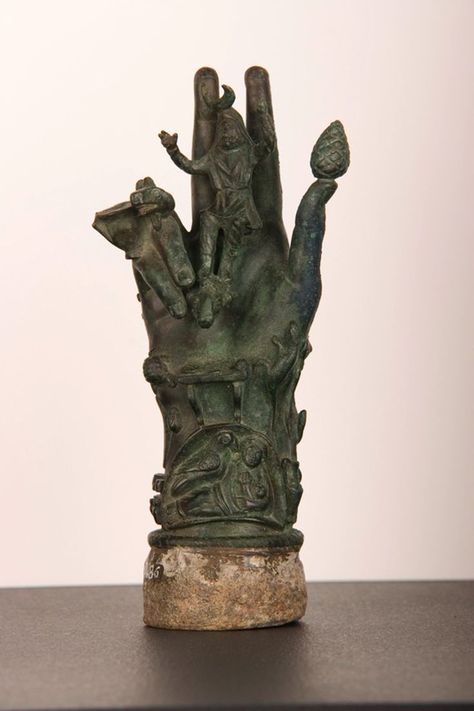
Bronze hand of Sabazius, with the god sitting in the centre of the palm, a snake, a caduceus, a knife, a scale and a woman with child
- Provenance: Magic Rites Complex, II 1, 12 (Pompeii) - Place of conservation: Melbourne Museum (Australia) - Chronology: 1st cent. CE
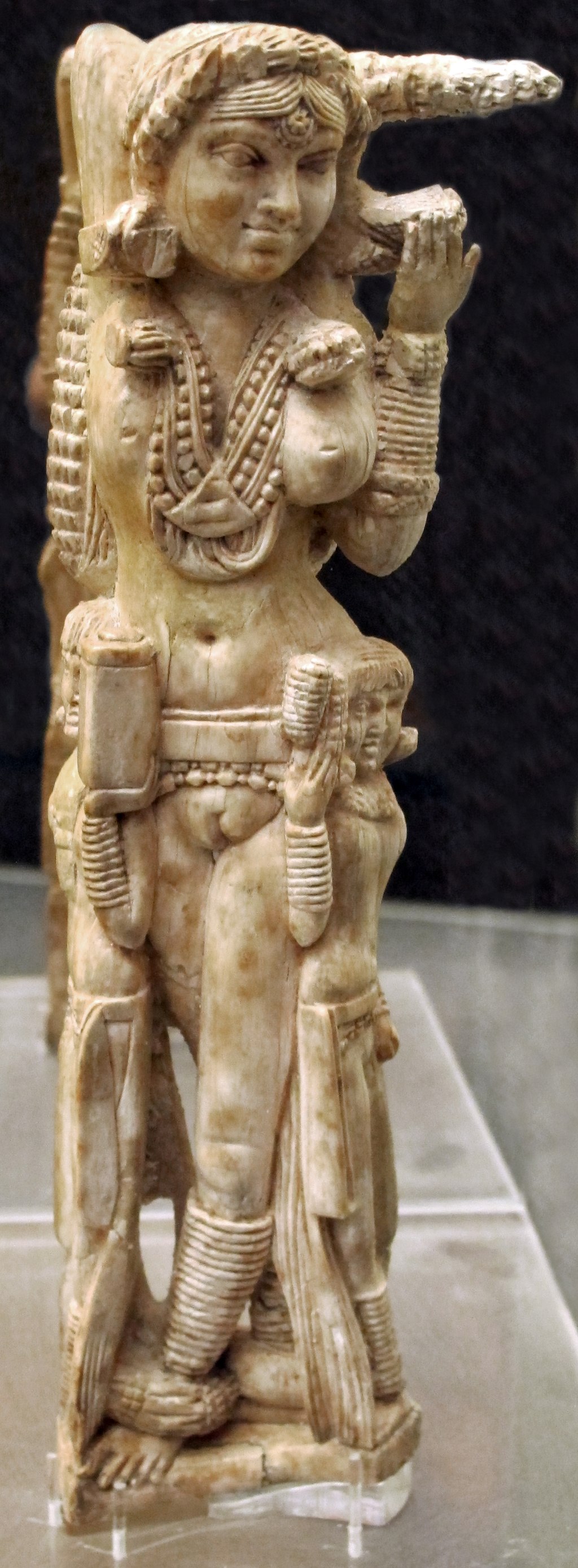
Ivory statuette of the Indian goddess Lakshmi
- Provenance: House of the Indian Statuette, I 8, 5 (Pompeii) - Place of conservation: National Archaeological Museum of Naples (Italy) - Chronology: 1st cent. CE
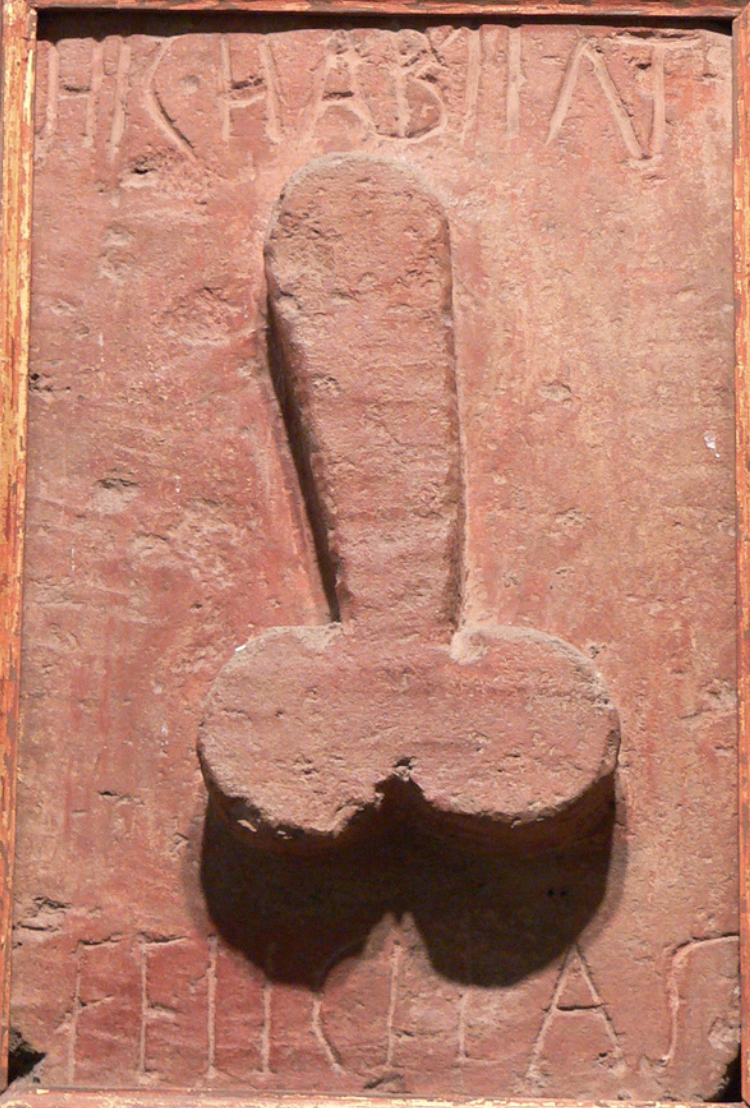
Stone relief with phallus and inscription “Hic habitat felicitas” (Here lives happiness)
- Provenance: Bakery of the insula of the House of Pansa, VI 6, 17 (Pompeii) - Place of conservation: National Archaeological Museum of Naples (Italy) - Chronology: 1st cent. CE

Fresco depicting Hercules strangling the Nemean lion
- Provenance: Augusteum (Herculaneum) - Place of conservation: In situ? - Chronology: 1st cent. CE
Augusteum = place honoring Augustus (first emperor of Rome)
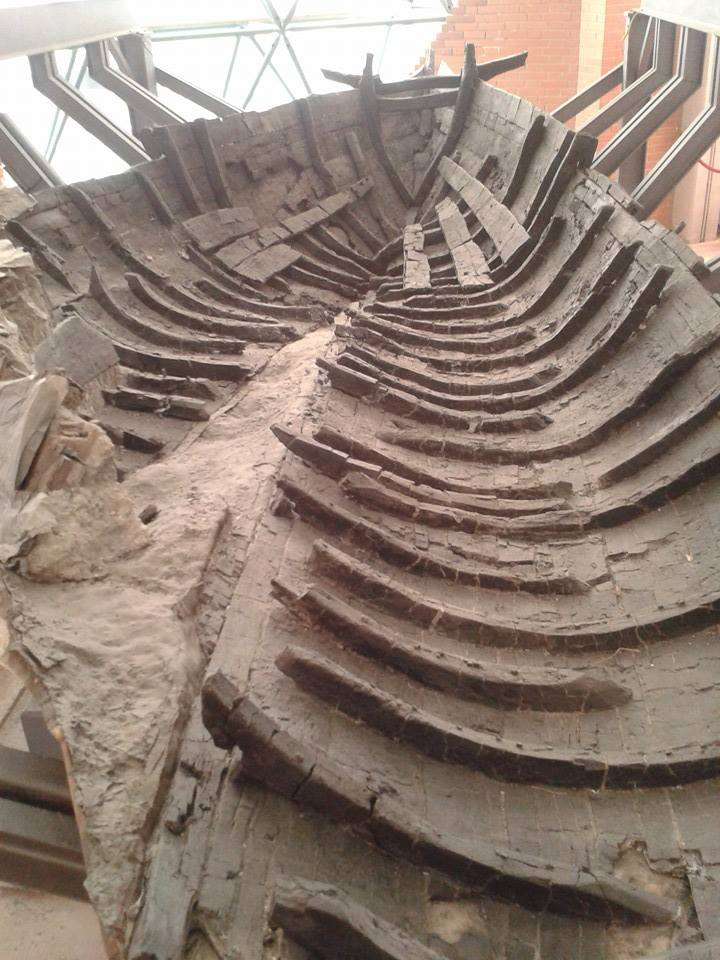
Wooden boat
- Provenance: Seashore (Herculaneum) - Place of conservation: Padiglione della Barca, Ercolano (Italy) - Chronology: 1st cent. CE
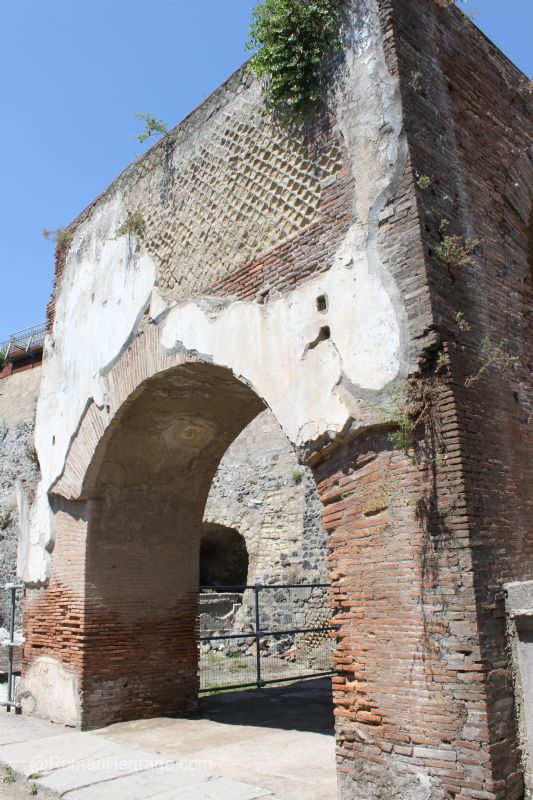
BRICK ARCH
Provenance: Decumanus Maximus
Conservation: In situ
Chronology: 1st century CE
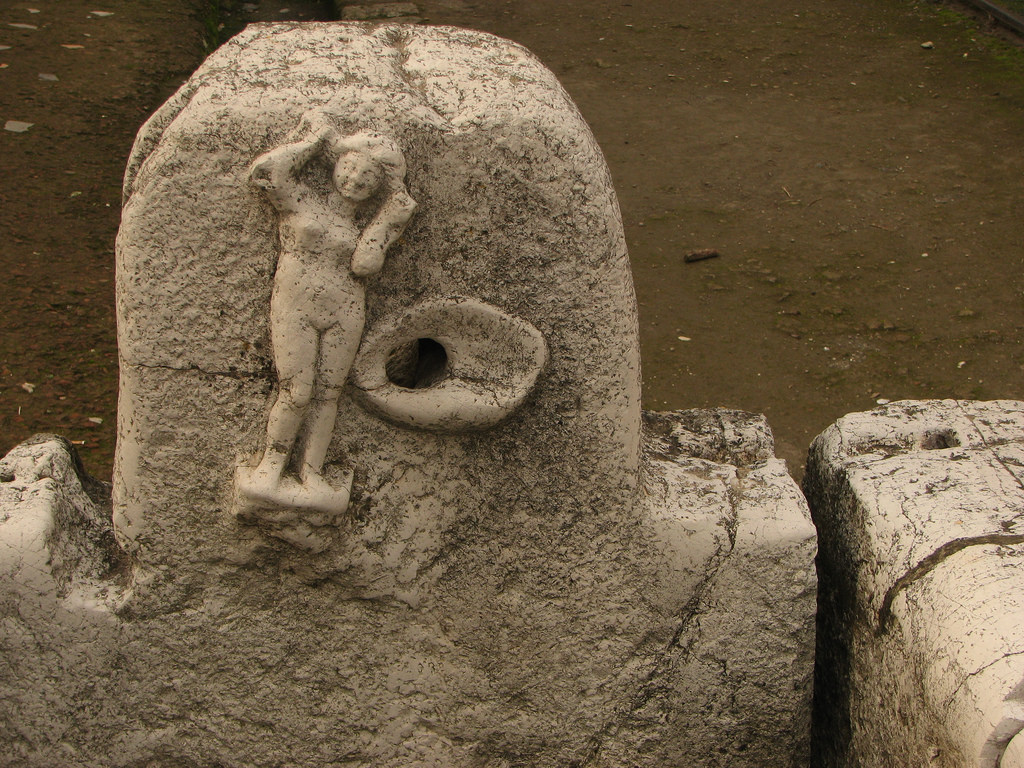
Fountain of Venus
- Provenance: Decumanus Maximus (Herculaneum) - Place of conservation: In situ - Chronology: 1st cent. CE
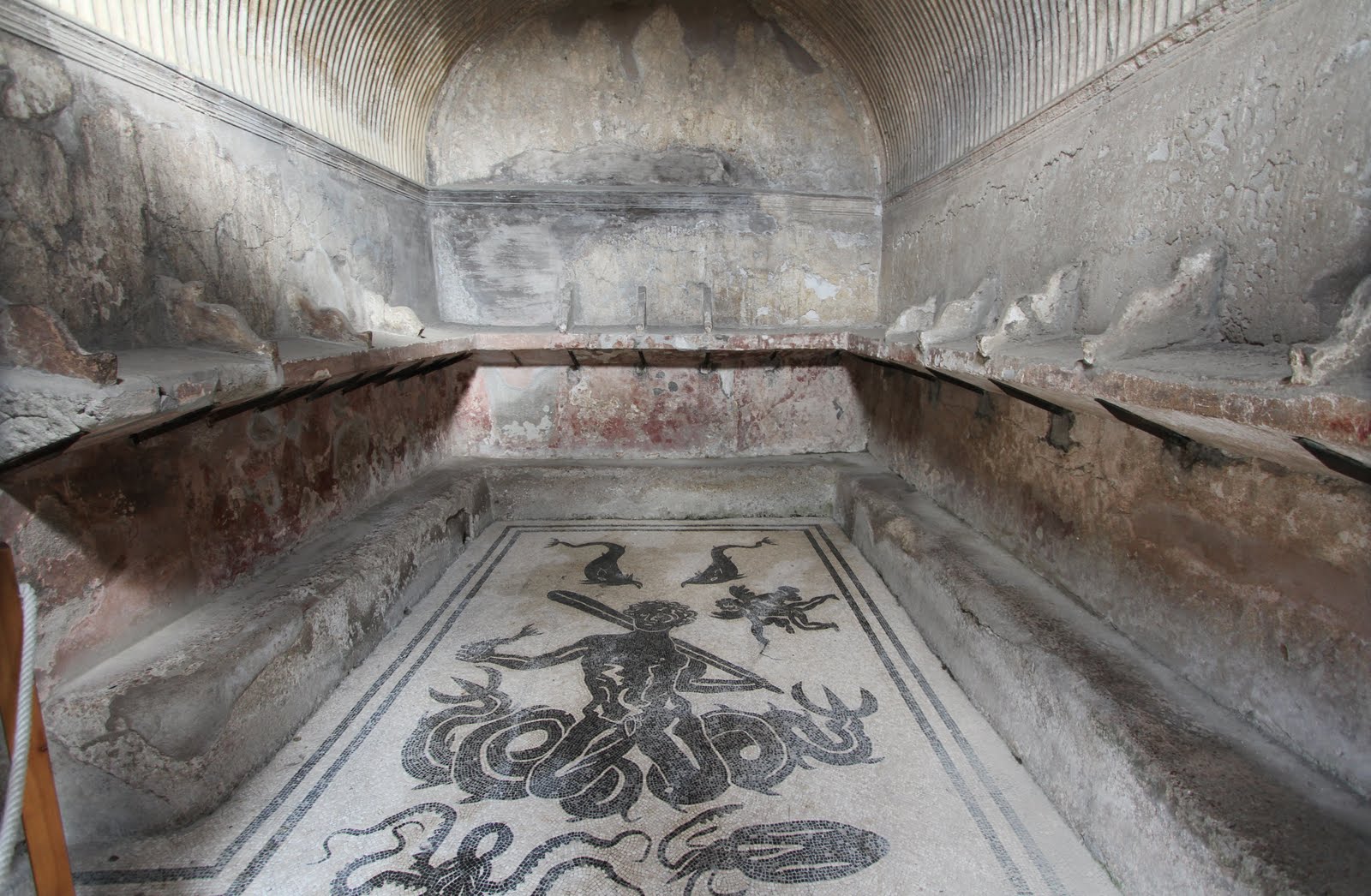
Women baths
- Provenance: Central Baths (Herculaneum) - Place of conservation: In situ - Chronology: 1st cent. CE
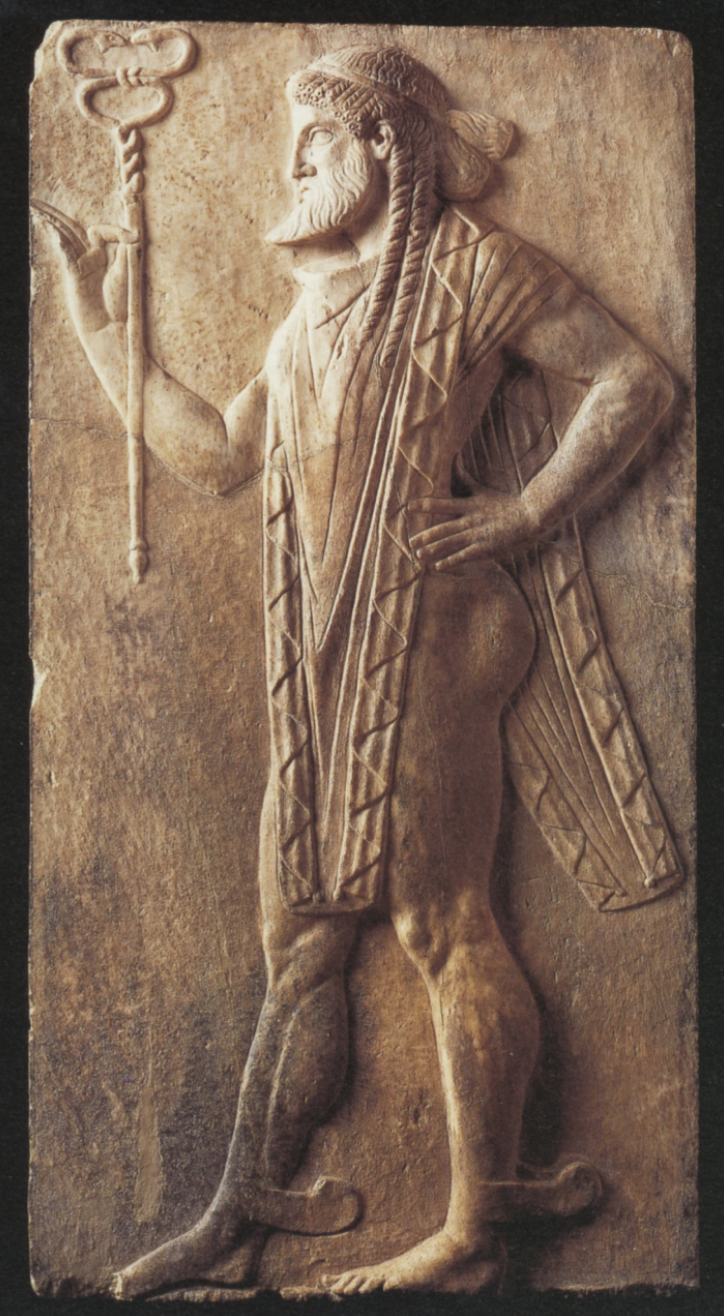
Relief with archaistic representation of Mercury
- Provenance: Temple B (Herculaneum) - Place of conservation: Antiquarium of Ercolano (Italy) - Chronology: 1st cent. CE
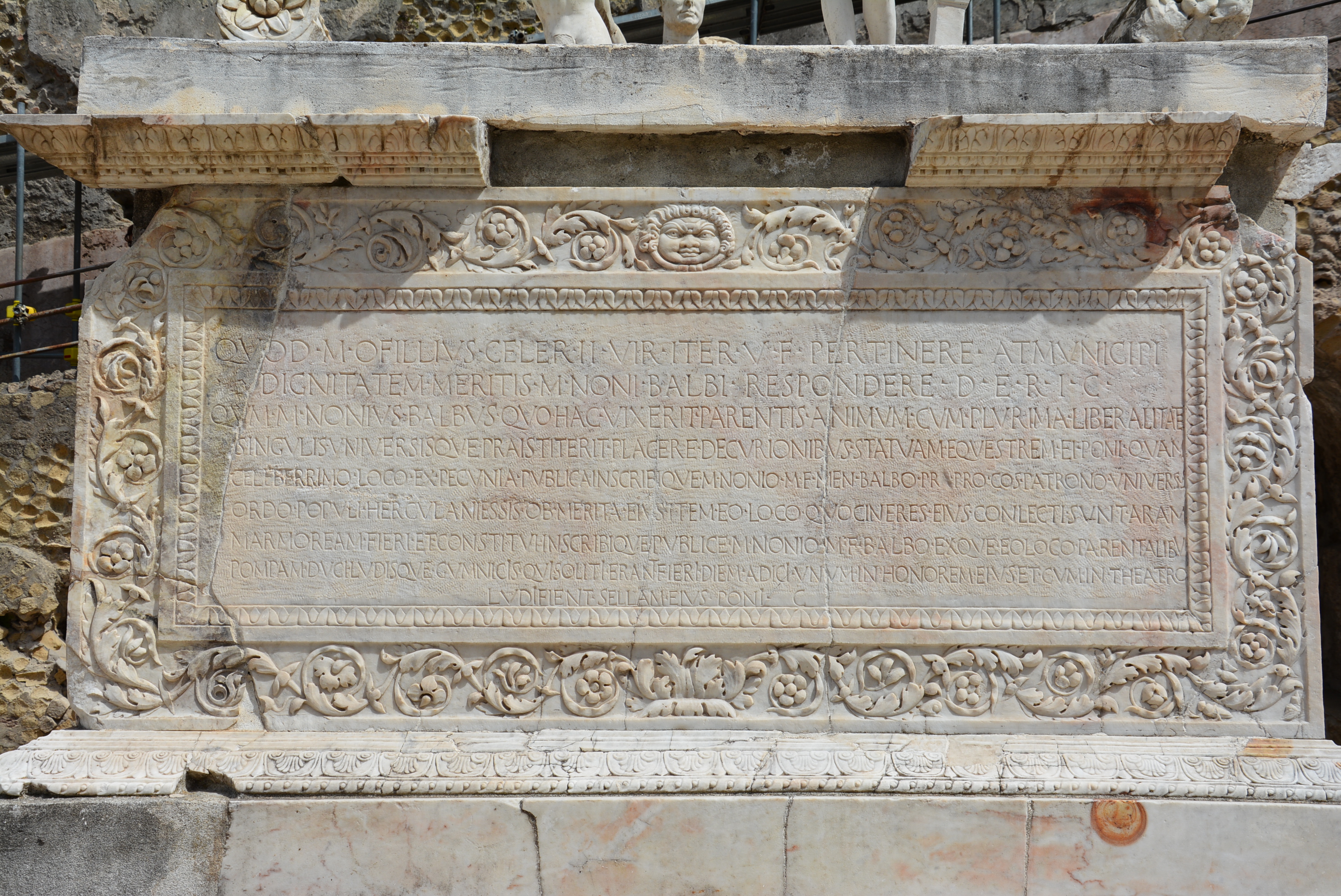
Inscription describing the funerary honors dedicated to Marcus Nonius Balbus
- Provenance: Terrace of Marcus Nonius Balbus (Herculaneum) - Place of conservation: Antiquarium of Ercolano (Italy) - Chronology: 1st cent. CE
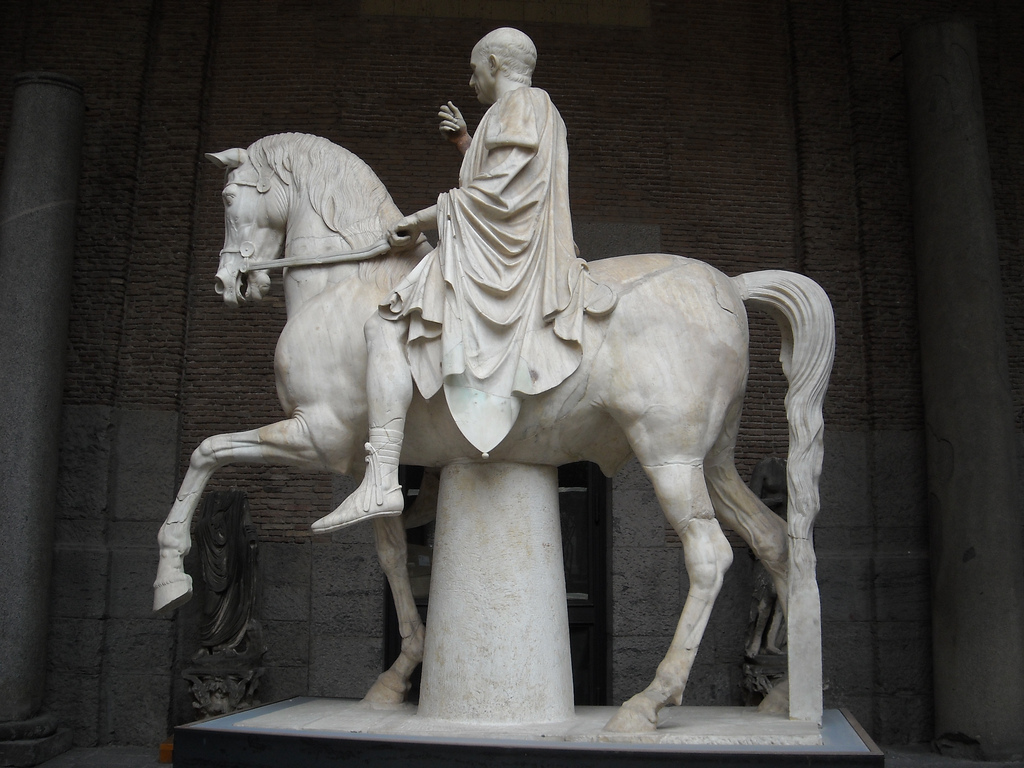
Equestrian statue of Marcus Nonius Balbus
- Provenance: Forum? (Herculaneum) - Place of conservation: National Archaeological Museum at Naples (Italy) - Chronology: 1st cent. CE
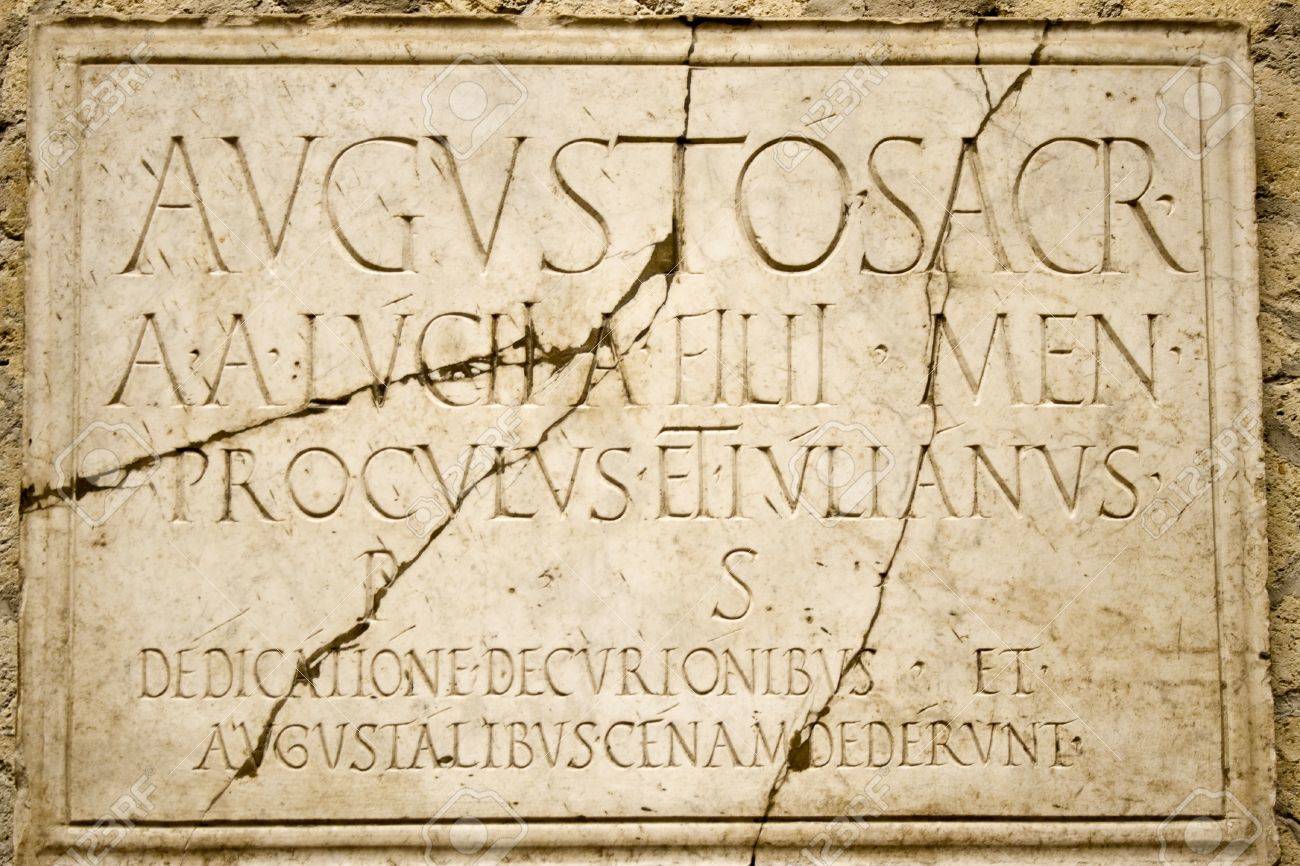
Dedication to Augustus
- Provenance: College of the Augustales (Herculaneum) - Place of conservation: Antiquarium of Ercolano (Italy) - Chronology: 1st cent. CE
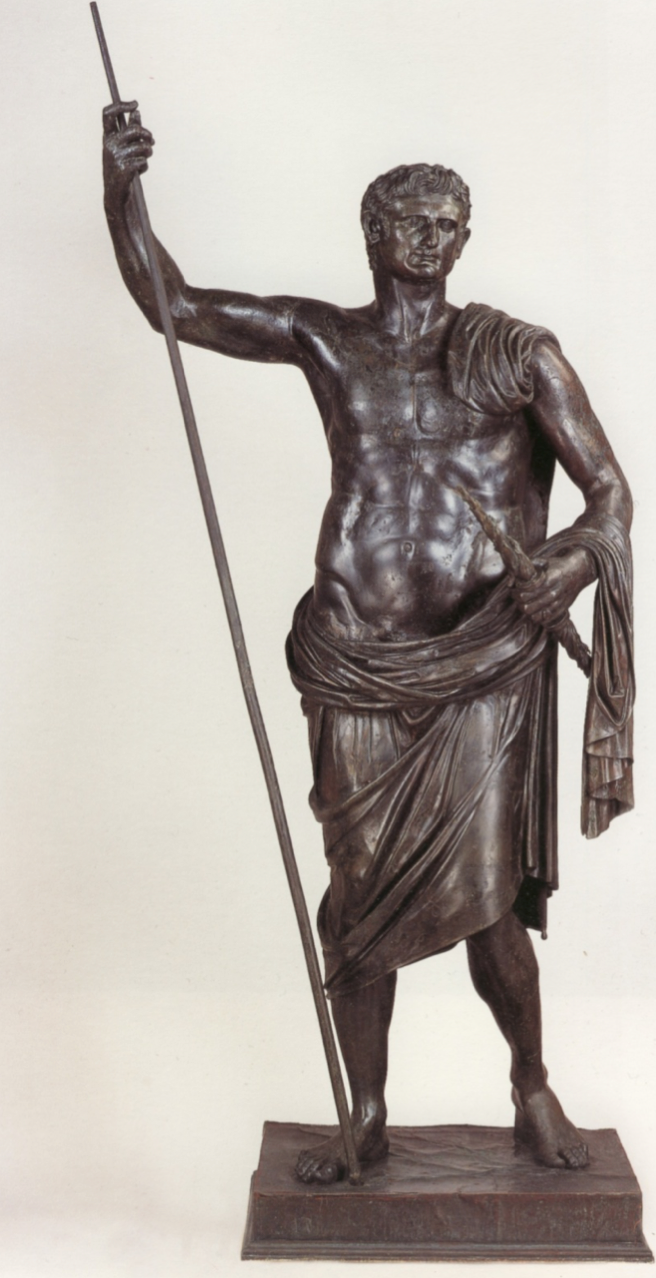
Bronze statue of Augustus
- Provenance: Augusteum (Herculaneum) - Place of conservation: National Archaeological Museum at Naples (Italy) - Chronology: 1st cent. CE
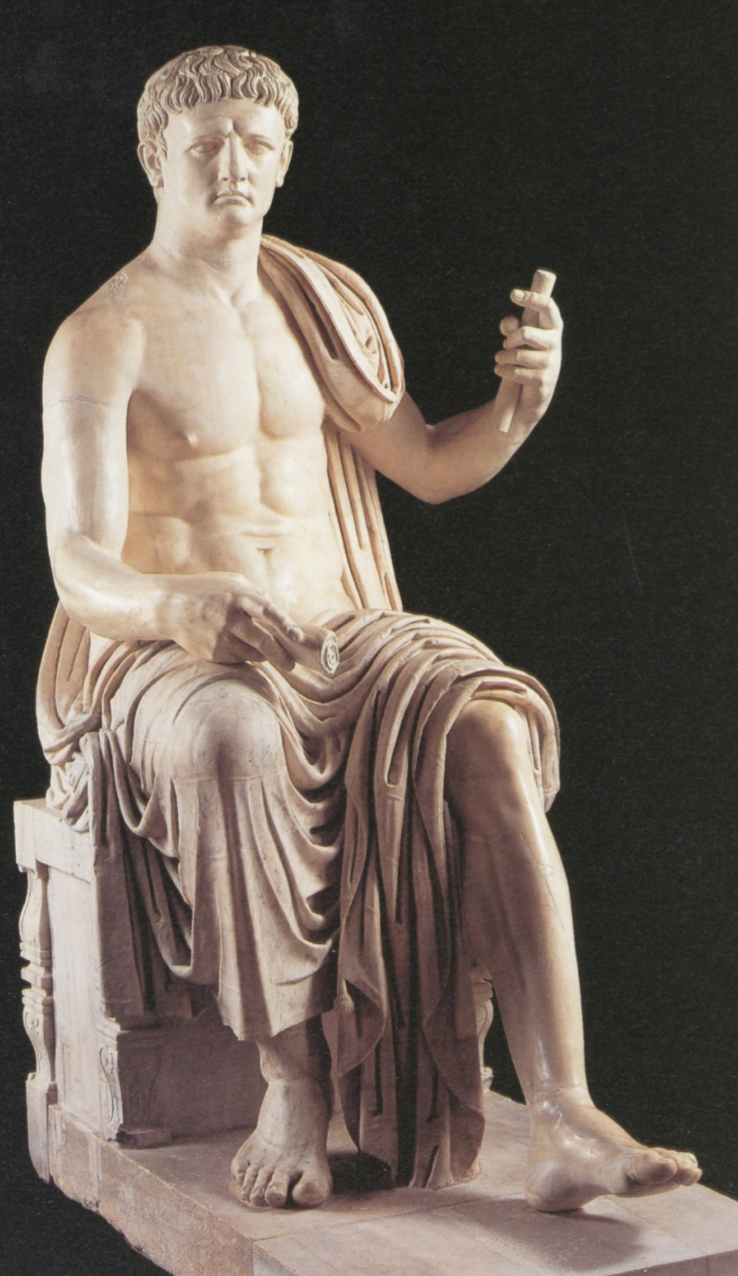
Marble statue of Claudius
- Provenance: Augusteum (Herculaneum) - Place of conservation: National Archaeological Museum at Naples (Italy) - Chronology: 1st cent. CE
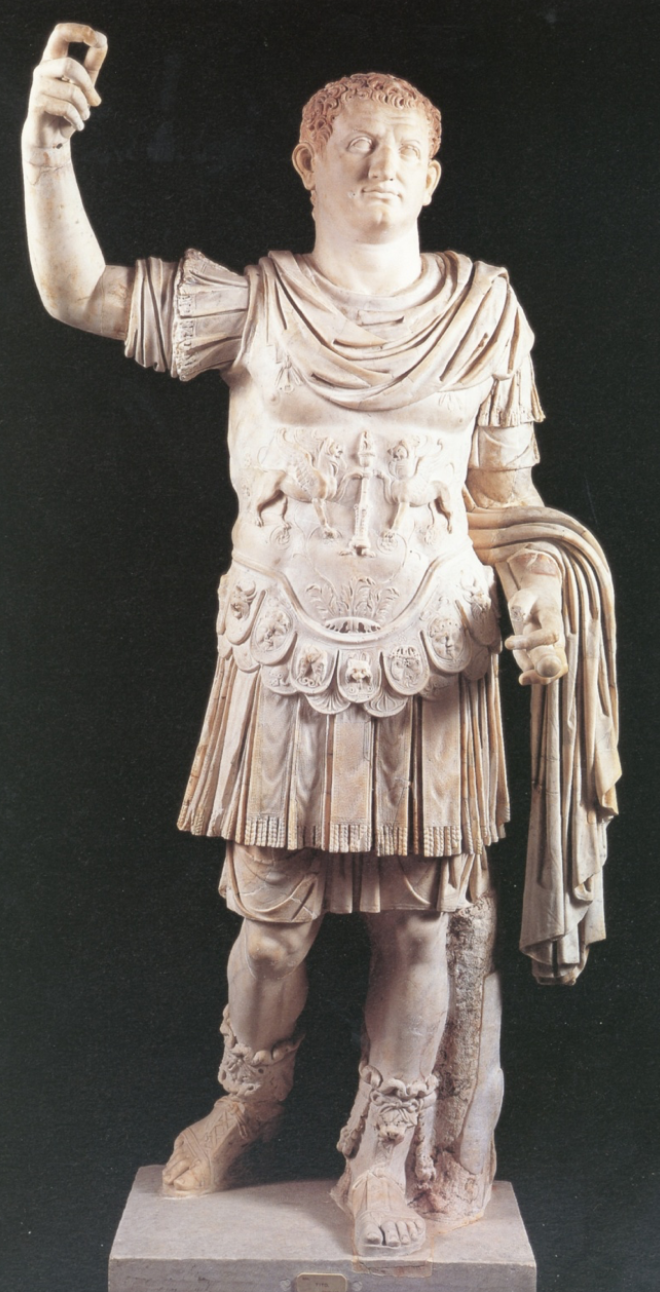
Marble statue of Titus
- Provenance: Augusteum (Herculaneum) - Place of conservation: National Archaeological Museum at Naples (Italy) - Chronology: July - October 79 CE
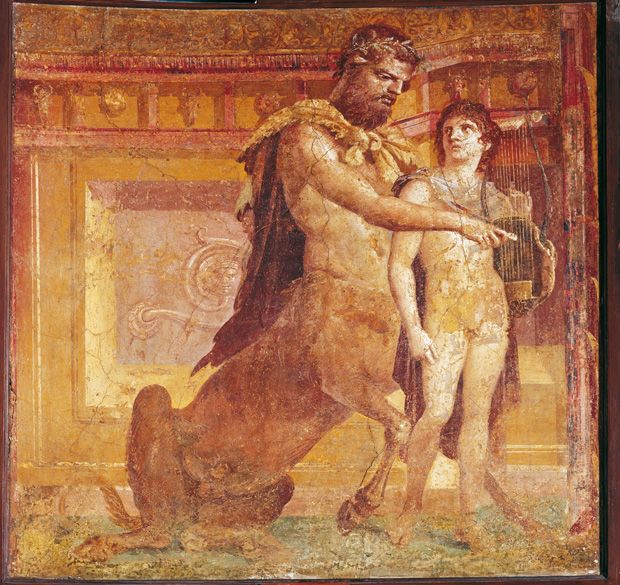
Fresco with Achilles and Chiron
- Provenance: Augusteum (Herculaneum) - Place of conservation: National Archaeological Museum at Naples (Italy) - Chronology: 1st cent. CE
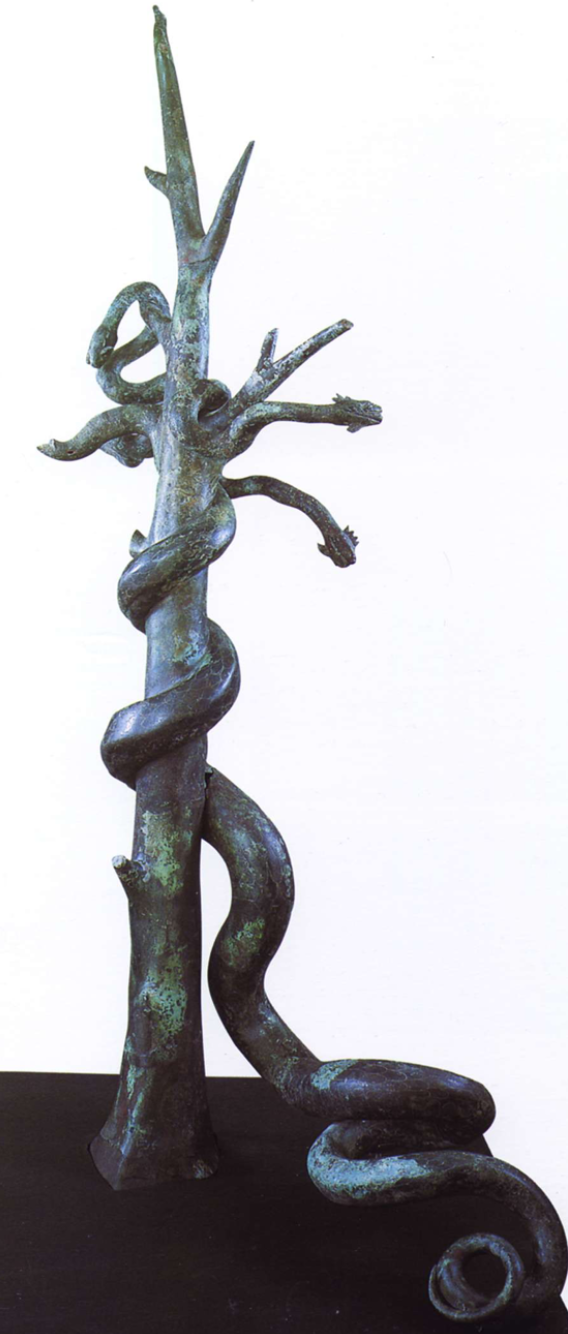
Bronze statue of the Hydra of Lerna
- Provenance: “Palaestra” (Herculaneum) - Place of conservation: Antiquarium of Ercolano (Italy) - Chronology: 1st cent. CE
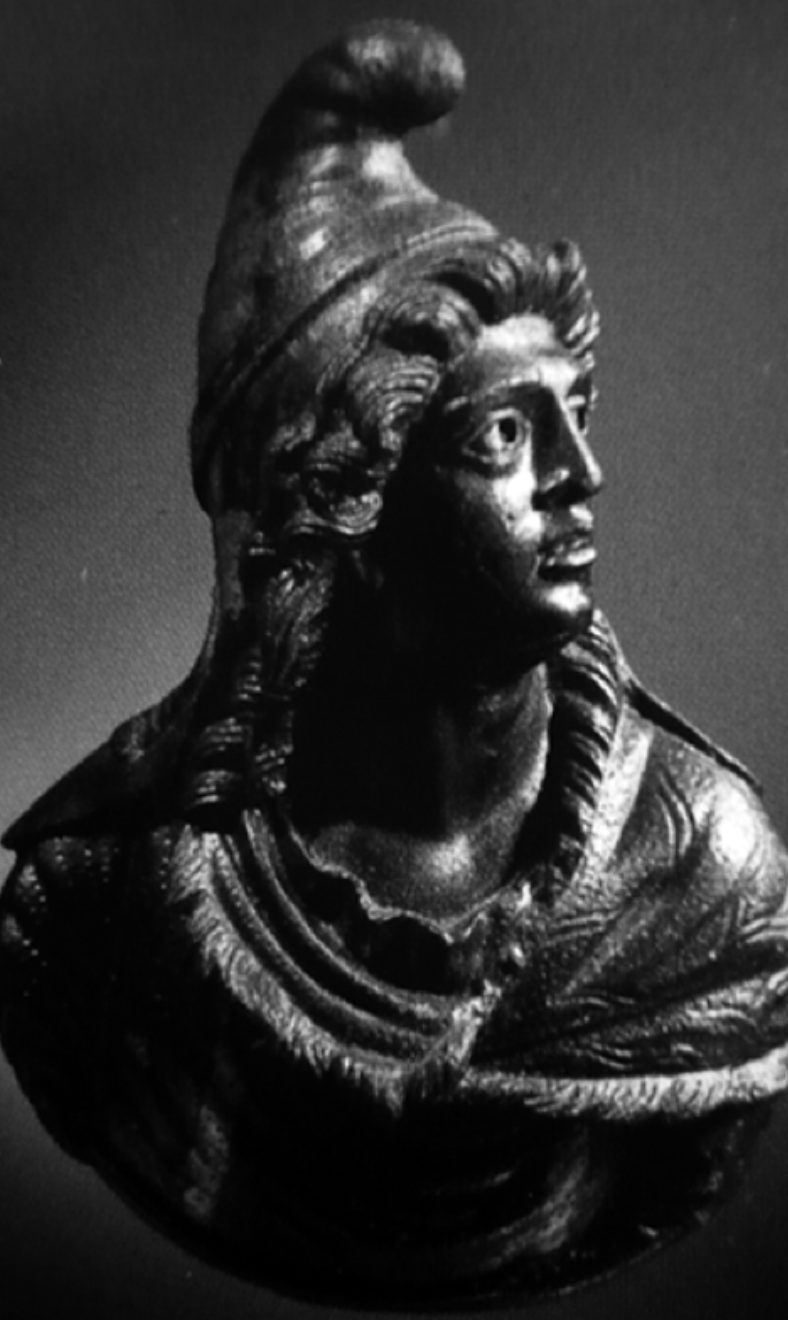
Bronze statuette of Attis
- Provenance: “Palaestra” (Herculaneum) - Place of conservation: Antiquarium of Ercolano (Italy) - Chronology: 1st cent. CE

Statue of Atum
- Provenance: “Palaestra” (Herculaneum) - Place of conservation: Antiquarium of Ercolano (Italy) - Chronology: 4th-3rd cent. BCE
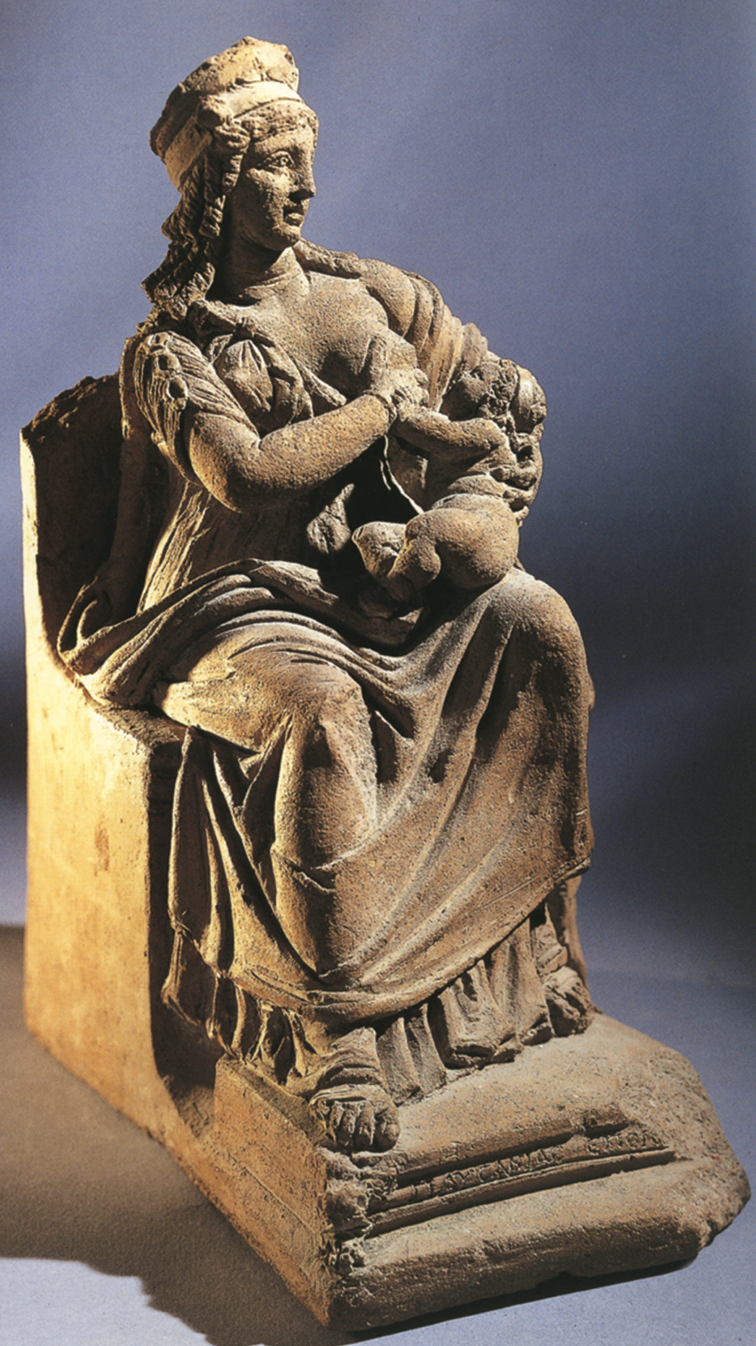
Terracotta statuette of Isis breastfeeding Harpocrates
- Provenance: “Palaestra” (Herculaneum) - Place of conservation: Antiquarium of Ercolano (Italy) - Chronology: 1st cent. BCE - 1st cent. CE
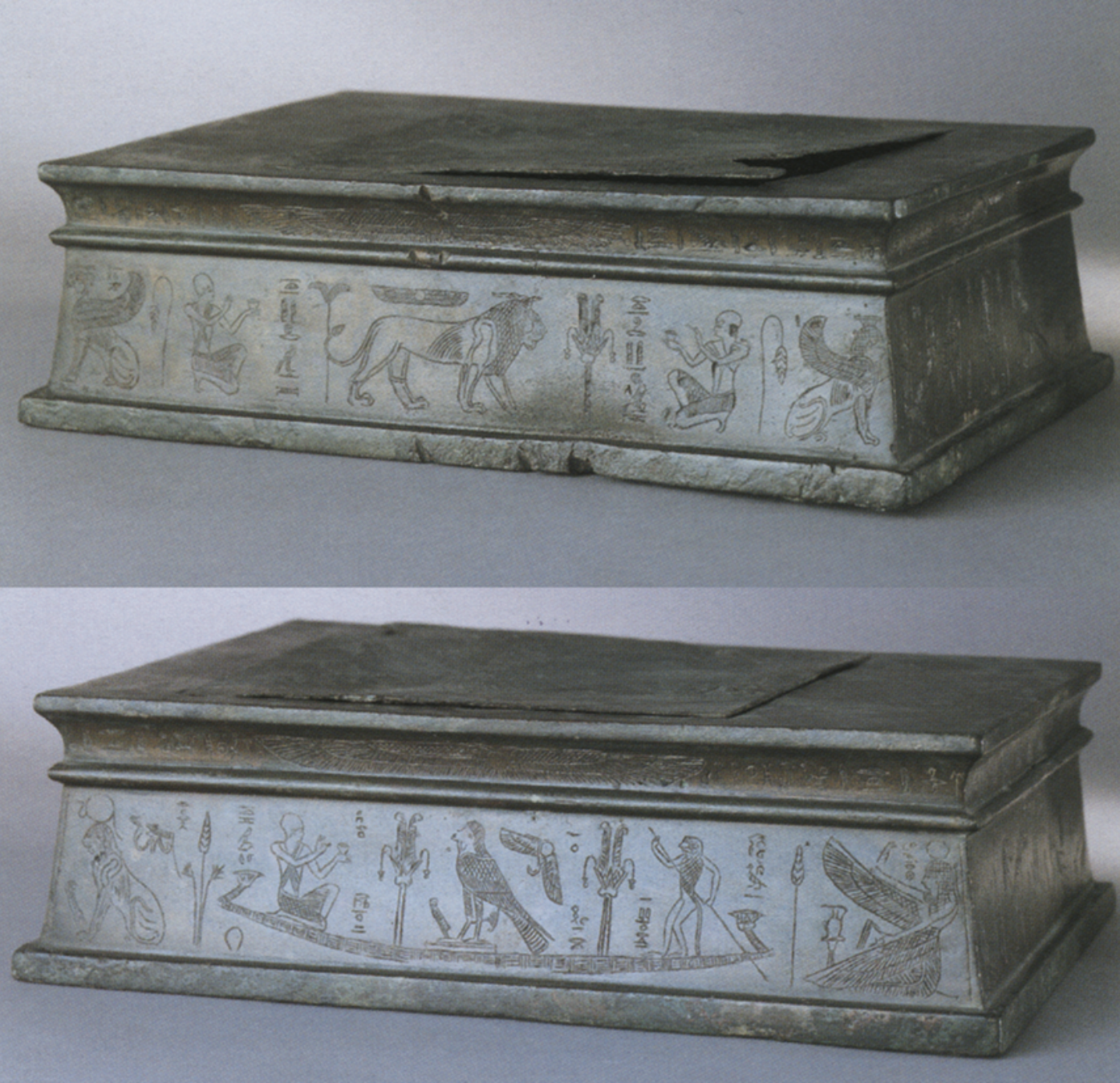
Bronze base with hieroglyphs
- Provenance: “Palaestra” (Herculaneum) - Place of conservation: National Archaeological Museum at Naples (Italy) - Chronology: 1st cent. CE
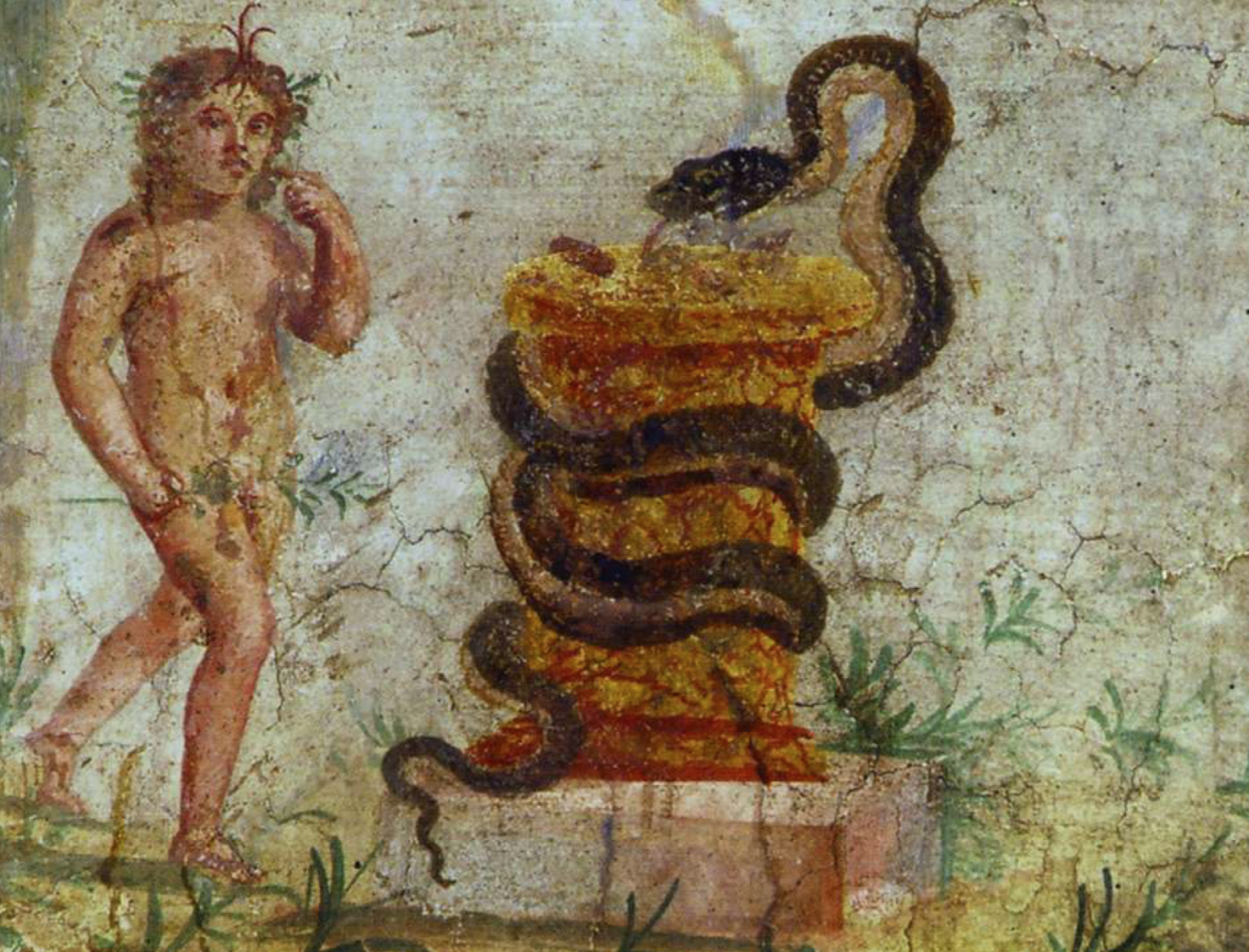
Fresco with representation of Harpocrates and a snake coiling around an altar
- Provenance: Unknown (Herculaneum) - Place of conservation: National Archaeological Museum at Naples (Italy) - Chronology: 1st cent. CE
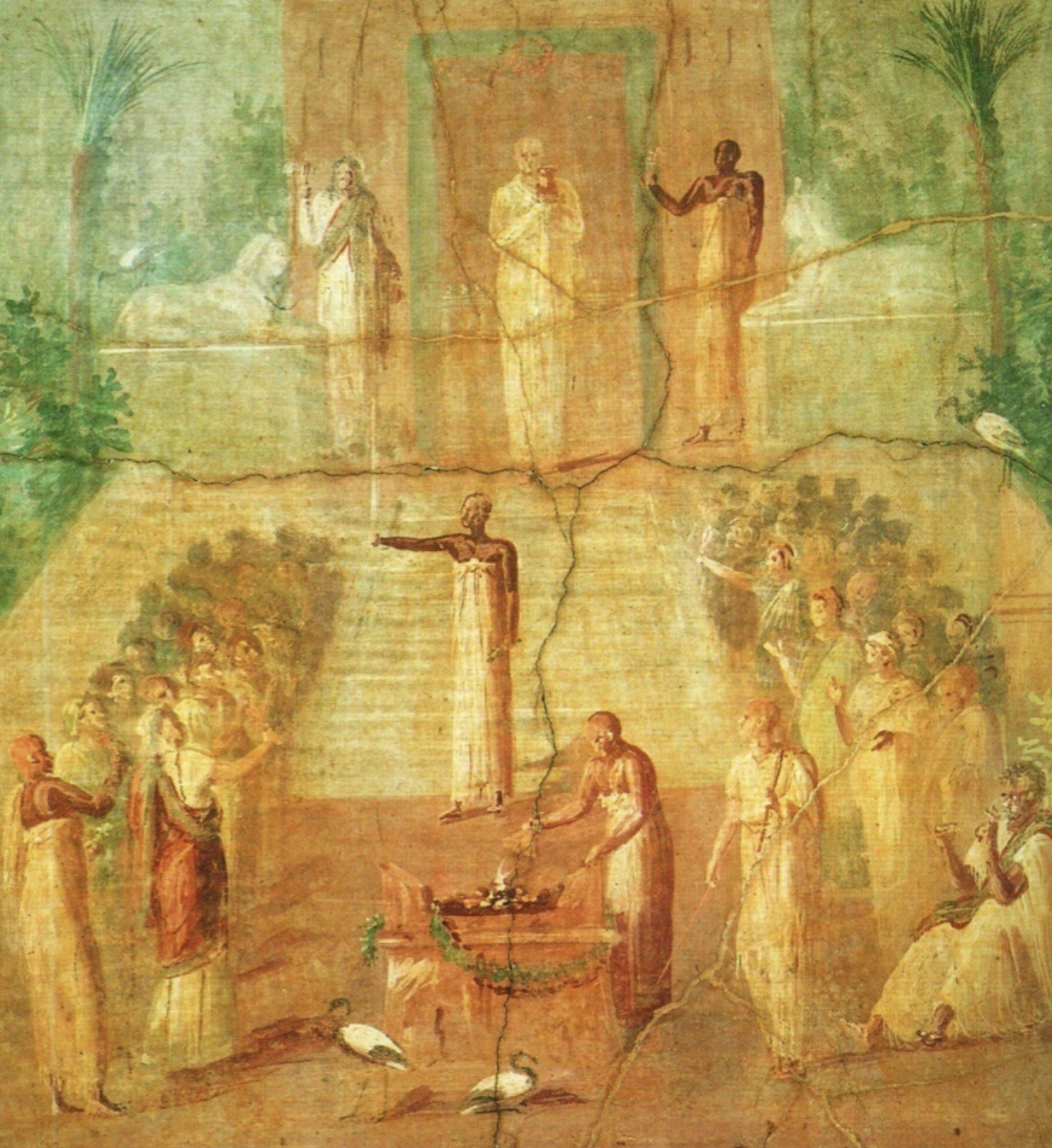
Fresco with Isiac ceremony
- Provenance: Unknown (Herculaneum) - Place of conservation: National Archaeological Museum at Naples (Italy) - Chronology: 1st cent. CE
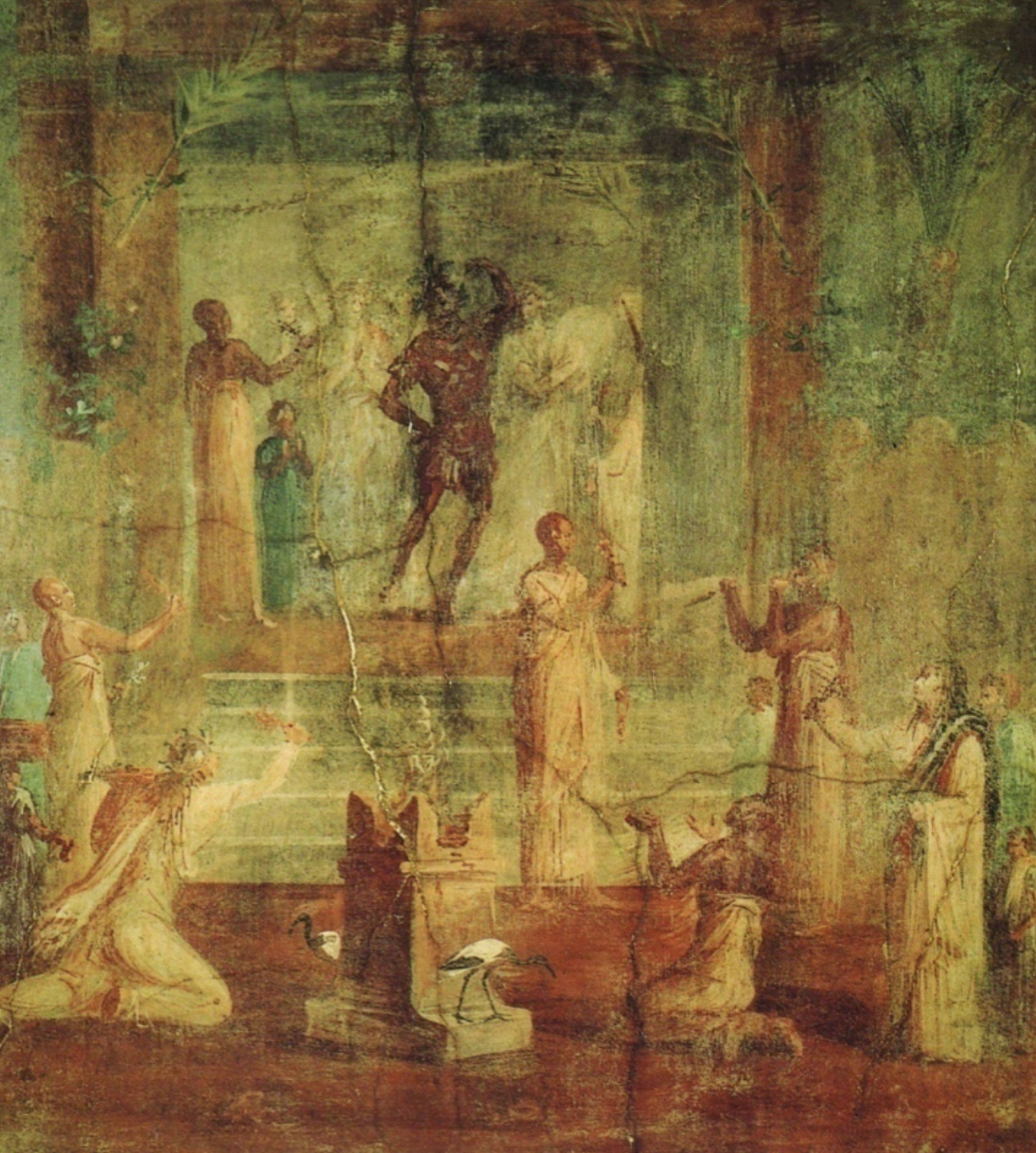
Fresco with Isiac ceremony
- Provenance: Unknown (Herculaneum) - Place of conservation: National Archaeological Museum at Naples (Italy) - Chronology: 1st cent. CE